- • 2+ years of experience in how the AI development lifecycle impacts systems, distributed computing, and cloud-native paradigm
- • Main research focused on how blockchain security could be enhanced by 65% within decentralized infrastructure
- • Other research projects (36+), looking at how future trends could impact network security in AI automated systems
- • Had 16+ publications in the Journal of Computer Science and secured +$16M in grant funding over the last two years
- • Assisted 13+ senior researchers and computer science professors in completing various applications by debugging codes
- • Participated in various other aspects of the software development process, including assessing briefs, writing code, and testing systems to ensure 100% accuracy
- • Built 10 full-stack web applications with Java and Ruby
- • Was tasked to help 5 researchers with the development of for-academia software with a focus on security
- • Analyzed the code specifications and transformations to comply with 100% of all security, accuracy, and client-briefed protocols and parameters
- • Met all mandatory schedule dates within the development process - receiving 98% approval in customer satisfaction

9 PhD Resume Examples & Guide for 2024
Your PhD resume must highlight your extensive research and expertise in your field of study. Tailor it to showcase how your unique skills are transferable to the job you're applying for. Demonstrate your proficiency in critical thinking and problem-solving through concrete examples of your work. Articulate your ability to communicate complex ideas effectively, as this is key to standing out.
All resume examples in this guide
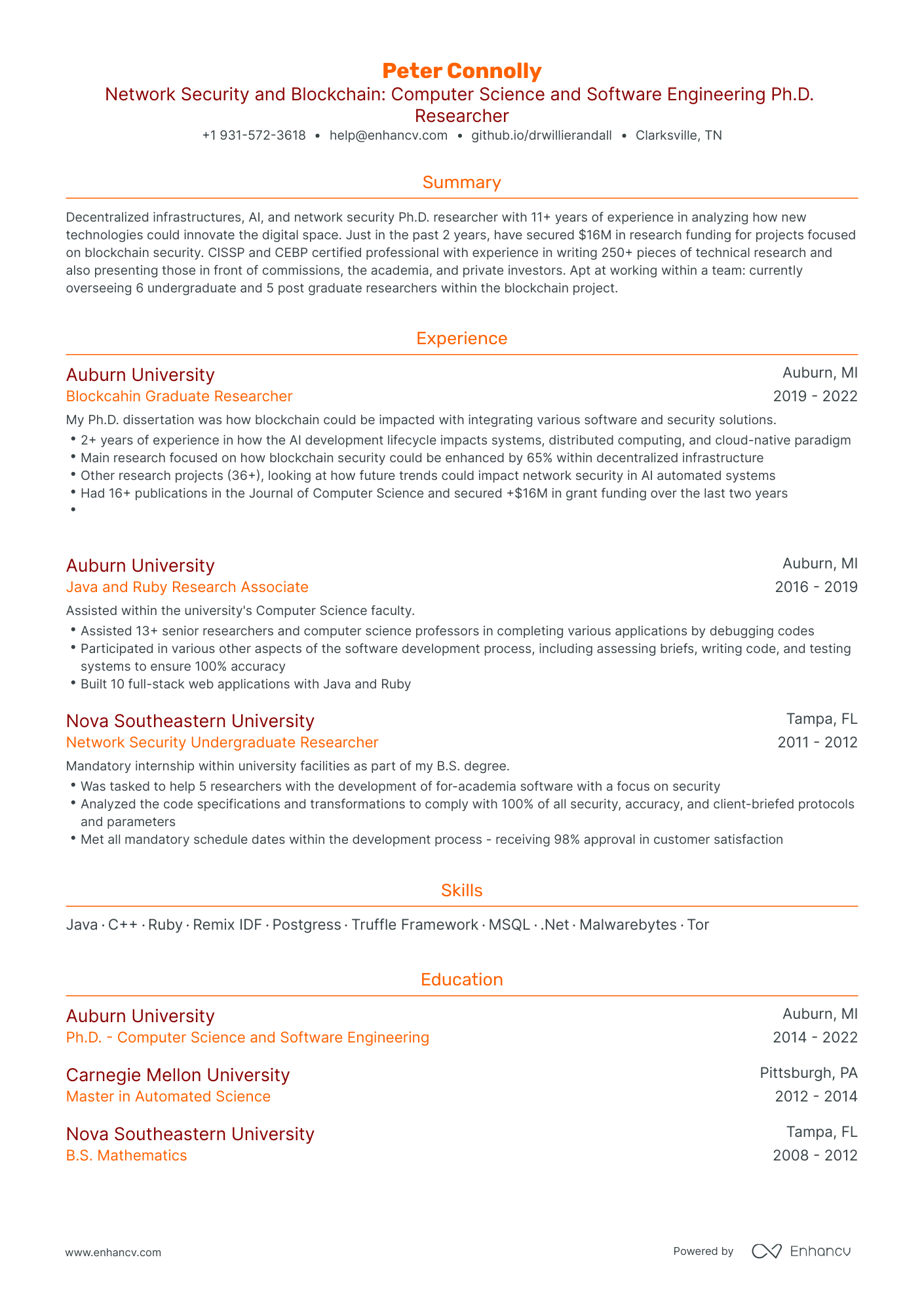
Traditional
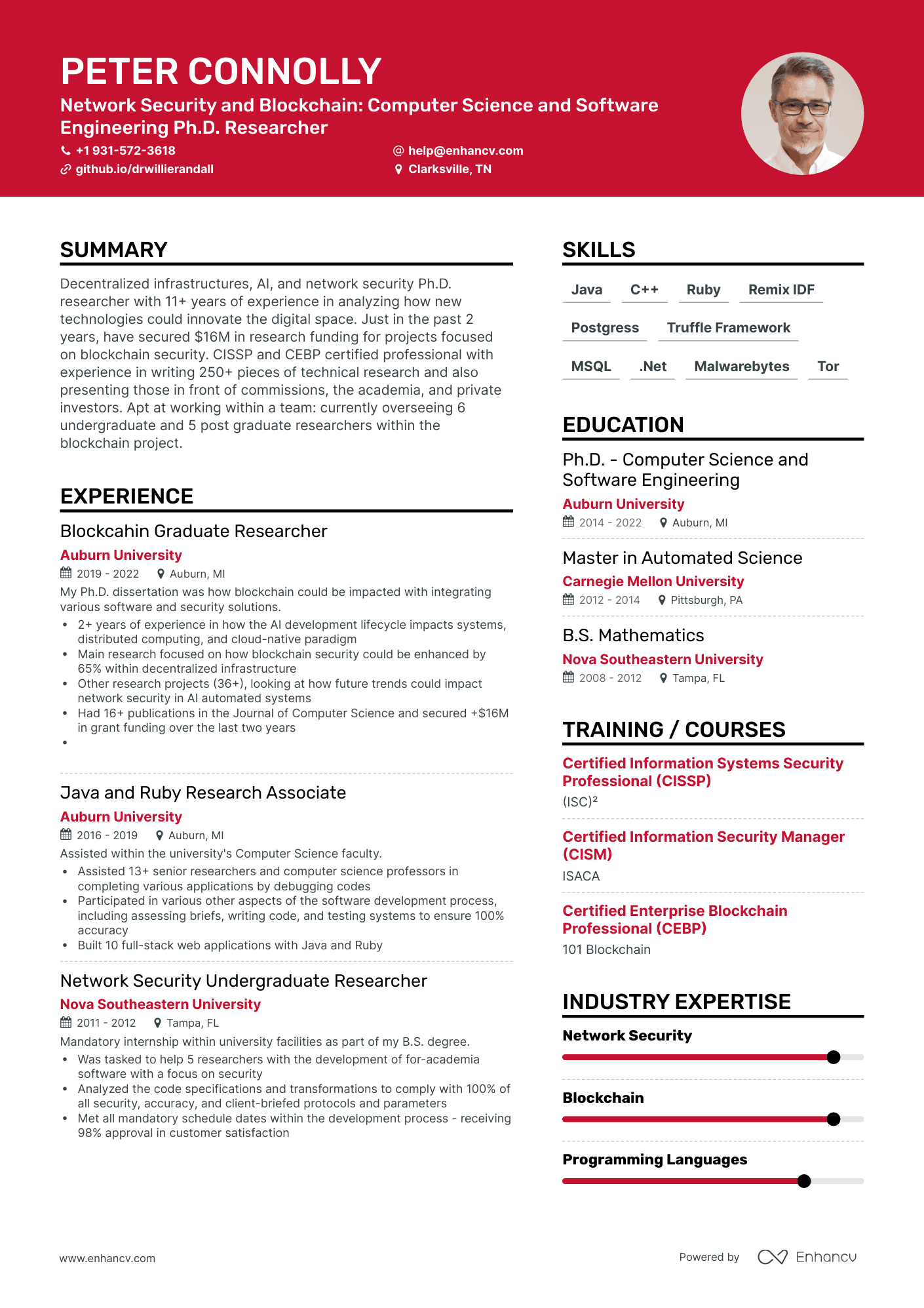
Lecturer in Molecular Engineering and Bioengineering Researcher: Biomedical Engineering, Ph.D. resume example
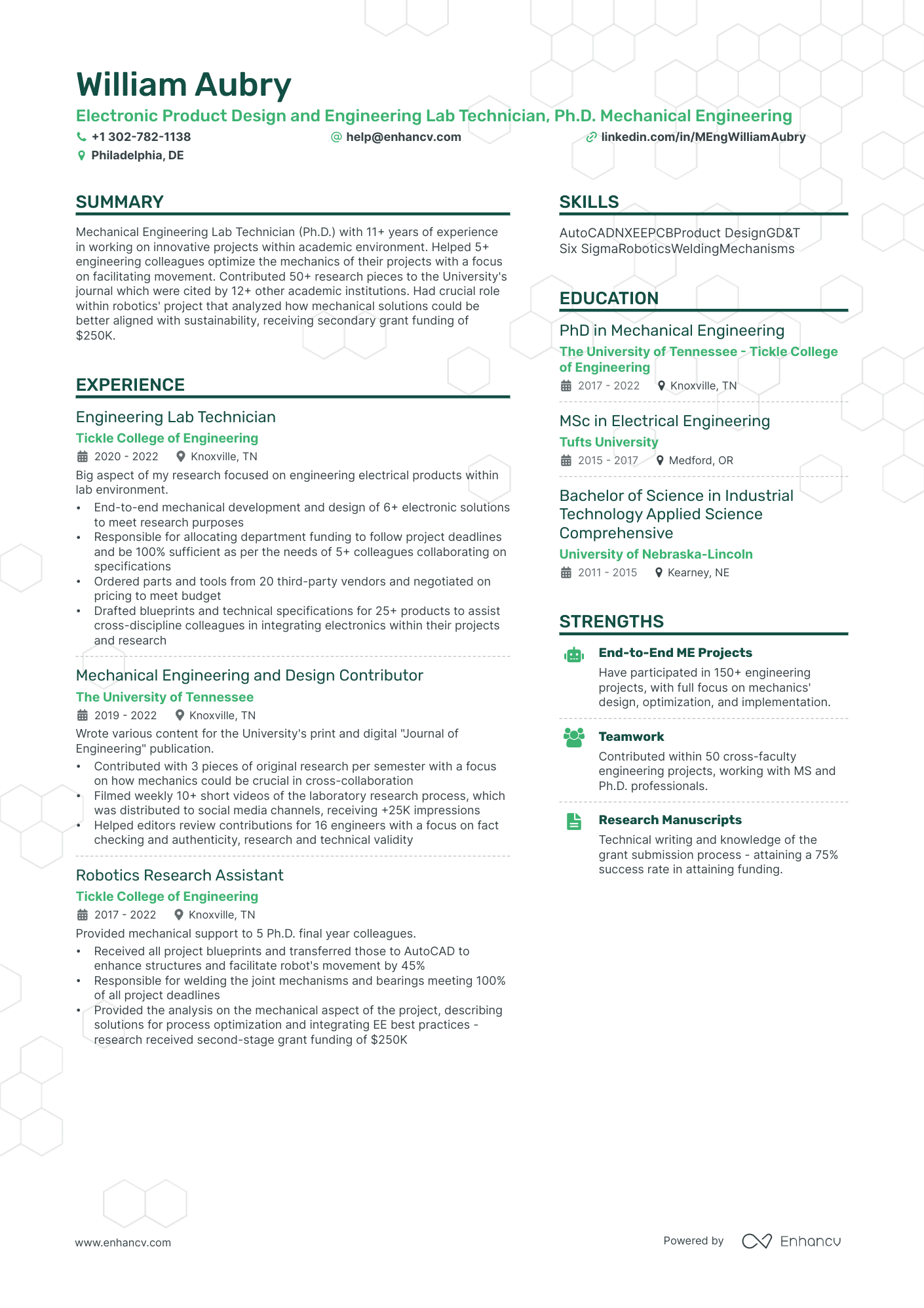
Electronic Product Design and Engineering Lab Technician, Ph.D. Mechanical Engineering resume example
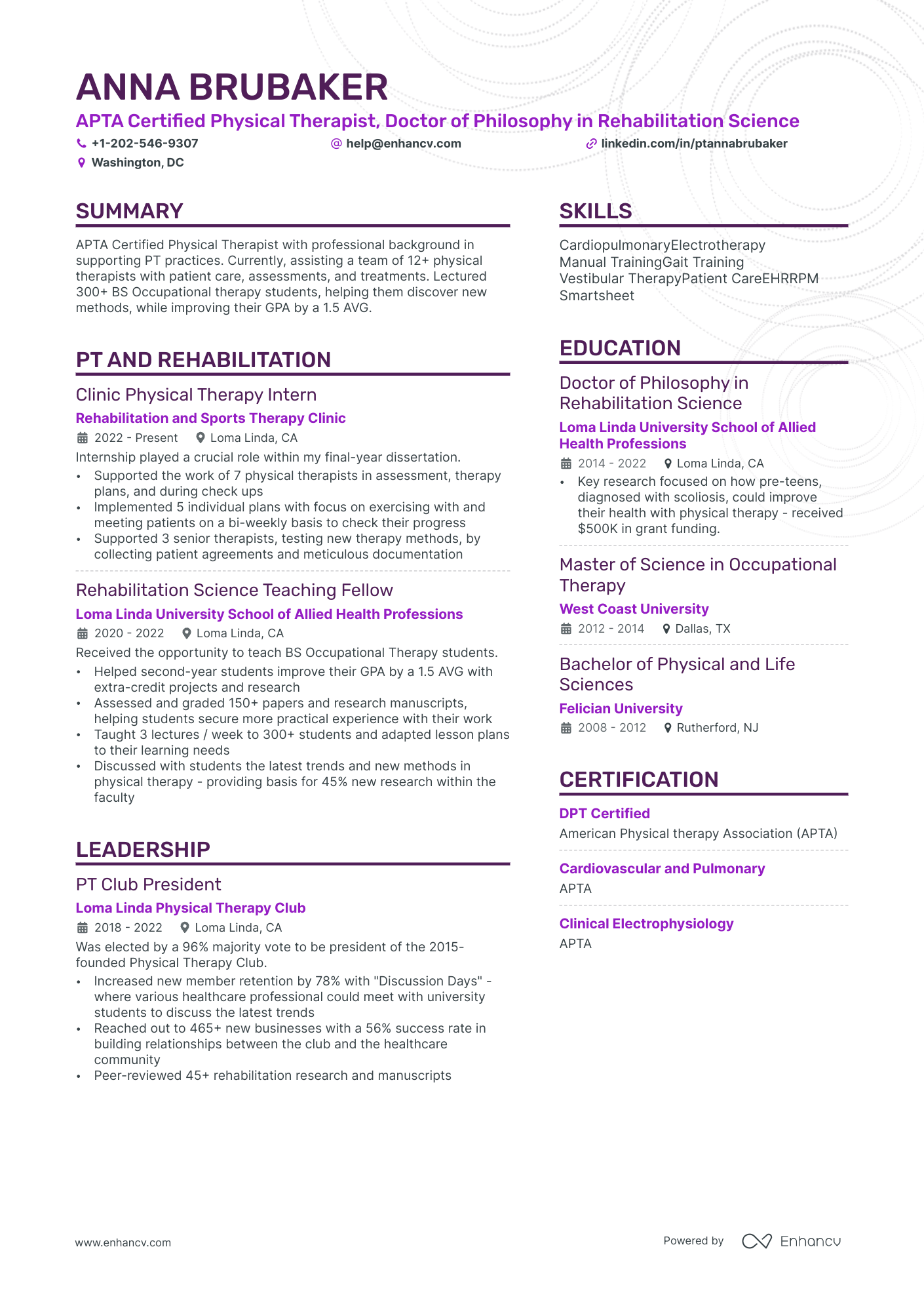
APTA Certified Physical Therapist, Doctor of Philosophy in Rehabilitation Science resume example
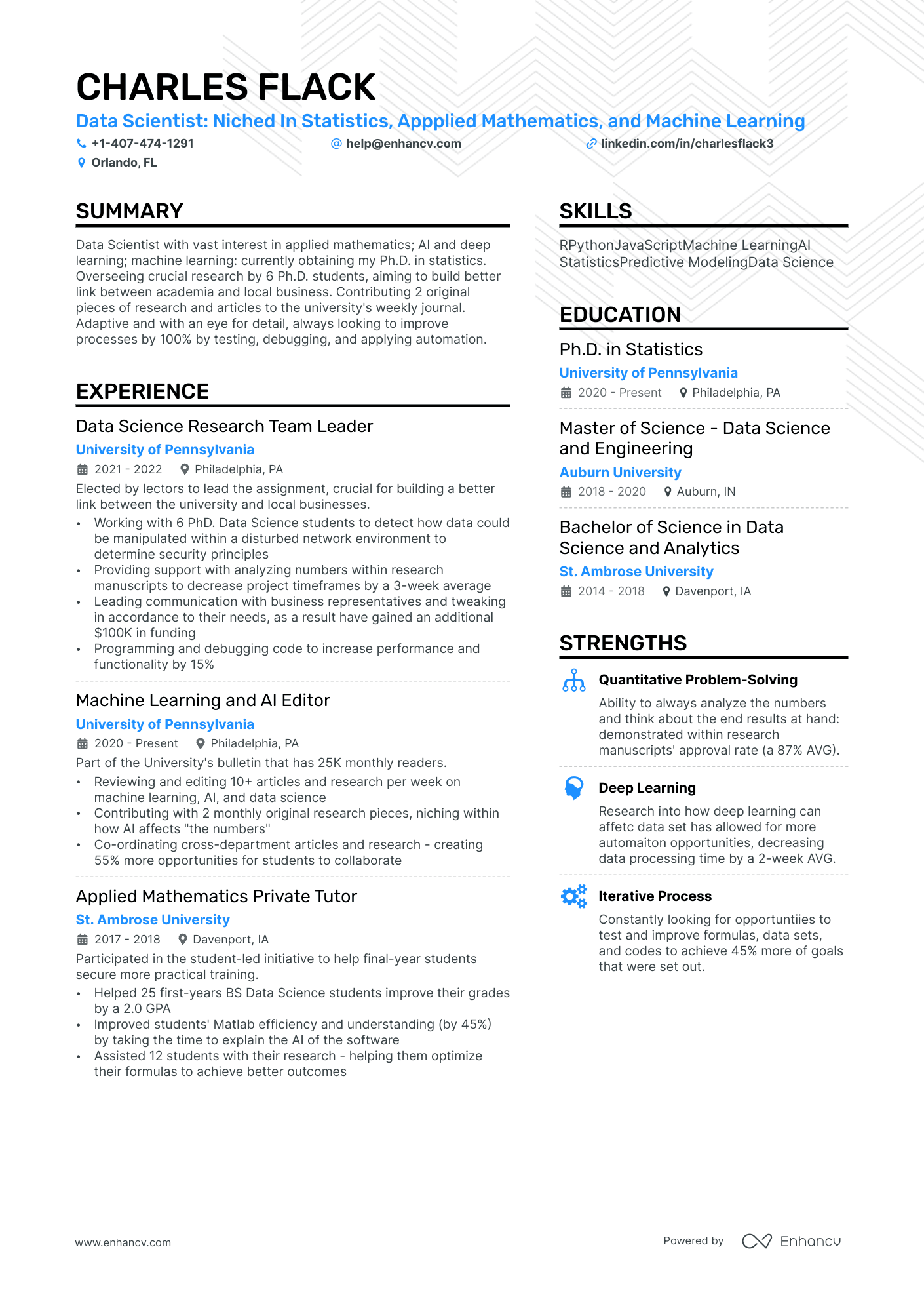
Data Scientist: Niched In Statistics, Appplied Mathematics, and Machine Learning resume example
Resume Guide
Guide Overview
Additional Resumes
Extra Reads
Writing Your Ph.D. Resume
Resume Header Tips
Ph.D. Resume Summary
Resume Experience Section
Systematizing Your Experience
How to Include Your Degree
Ph.D. in Progress on Resume
Skill Set for Ph.D. Resumes
Certifications on Resume
Additional Sections
Key Takeaways

George C. Jones's 8-year-Odyssey to his doctoral degree in engineering is finally complete. All he has to do now is complete his Ph.D. resume.
Little does George know that within the next three years, he'd apply to 500+ roles and still not be any closer to working in the renewable energy sector.
A little birdie told us why.
Everywhere George applied, he was labeled as an "egghead": book-smart with no real-world experience.
At least that's the story his resume told.
Unfortunately, George's sad "tale" depicts many graduates’ job searches.
By 2030/31, the US is expected to have 221,000 Ph.D. graduates . While this may be fantastic news for the academic community, the job pool is limited.
Swimming into the big blue sea - a.k.a. the "real world" - would require Ph.D. graduates to adapt their resumes to the business or industry requirements.
And listing vague bullets pinpointing your experience just won't do.
Enhancv knows how to translate your skills, knowledge, and achievements to ensure your resume stands out in the vast talent pool.
Because a well-written Ph.D. resume , showing skills, passion, and knowledge, is your ticket to the moon and beyond.
Our exclusive, Ph.D. resume guide will answer some of the following questions for you:
- What are some of the biggest, unintentional mistakes Ph.D. graduates tend to make when writing their resumes?
- Perfecting the top one-third of your resume: how to get recruiters' attention every time?
- 102 of the most popular Ph.D. skills you need to add to your resume right now!
- Lacking much professional experience: how to align your academic background with job expectations?
- Get inspired with more ideas about formatting, writing your resume summary, and including your academic body of work in a way that works.
4 additional Ph.D. resume samples and why they work
Ph.d. bioengineering graduate.
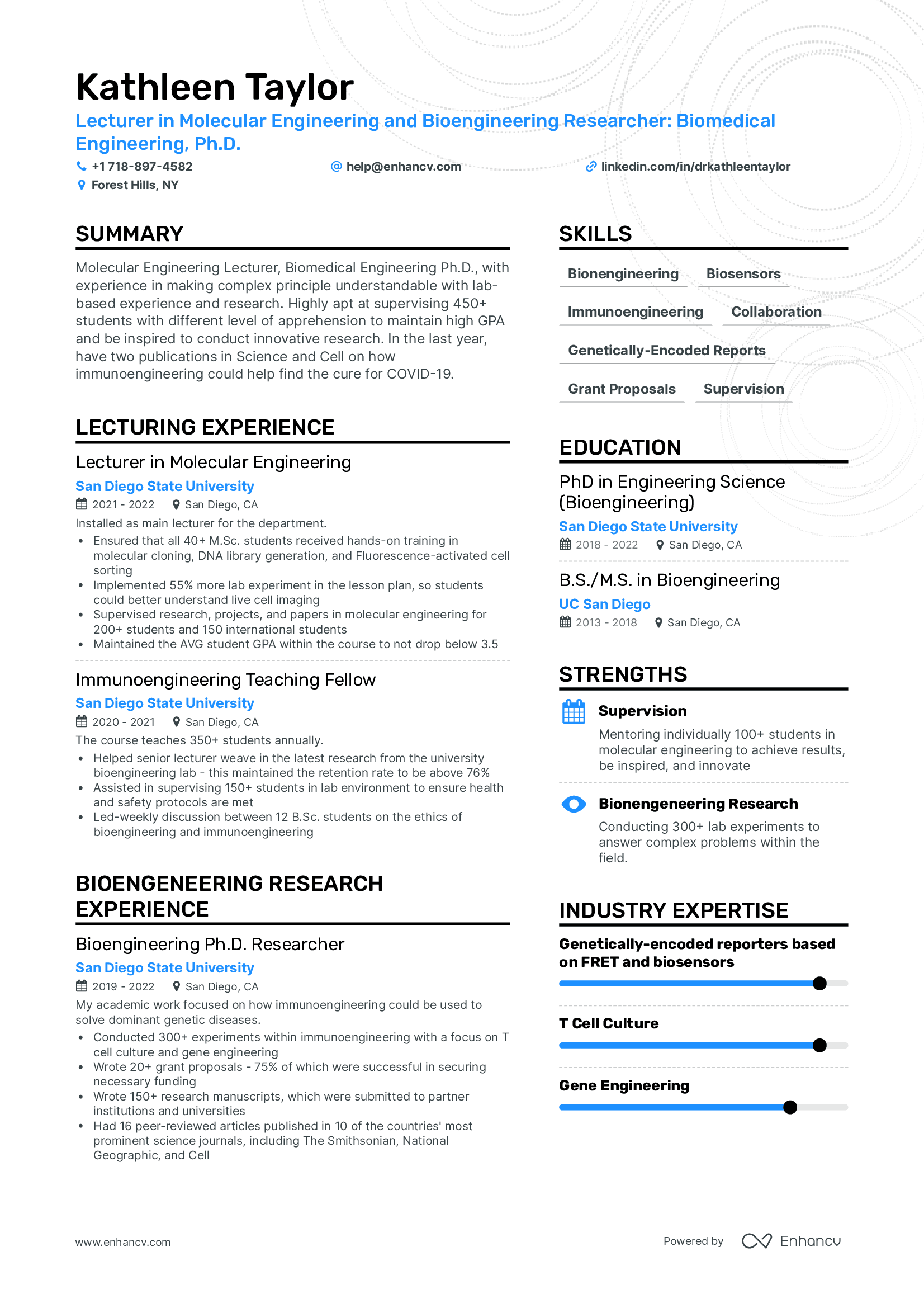
This Ph.D. Bioengineering Graduate has certainly focused her effort on getting that tenure-track position.
Here’s why her resume works.
Within the top one-third of Dr. Taylor’s resume (the headlines, summary, and skills section), you’ll find many relevant keywords for the job advert.
She has also used the summary to qualify and quantify her results to help recruiters better understand her strengths.
The experience section is split into two parts: the first one notes all relevant teaching experience; the second section showcases depth and knowledge of research.
Dr. Taylor has included industry experience and strengths to further define her skill set and show results.
This approach would also be very helpful for any Applicant Tracking System (ATS) reviewing the resume, as it cross-aligns the candidate’s talents with the job requirements.
Ph.D. mechanical engineering
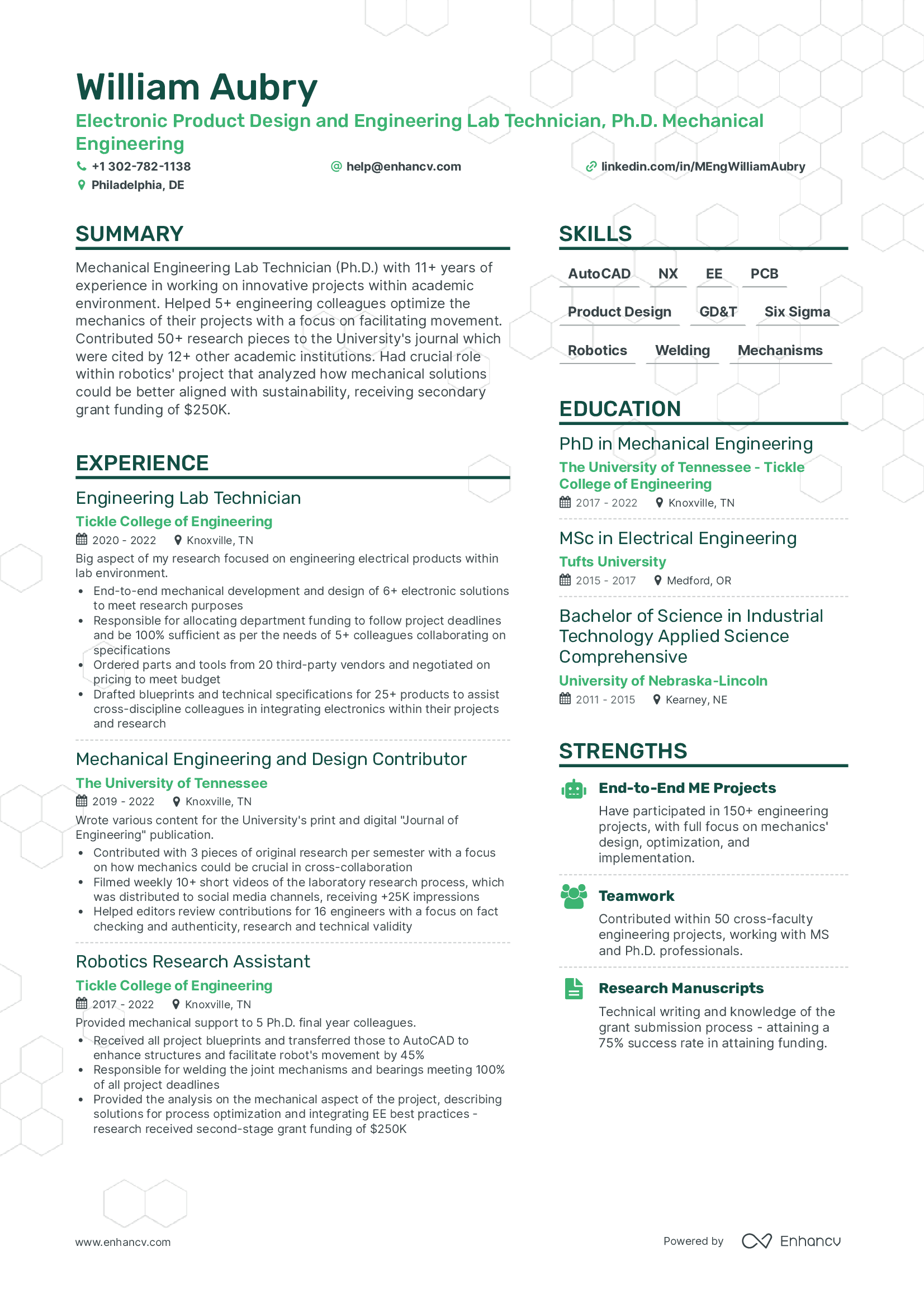
If you’re wondering how to translate your academics into real-life experience, check this example out.
Dr. Aubry’s resume headline highlights his area of expertise and his Ph.D. degree, while his summary qualifies his key academic achievements, contributions, and success.
Dr. Aubry’s skills section focuses more on the technology he is apt at within the specified job requirements.
His roles as a lab technician, contributor, and research assistant also hint to recruiters that he’s results-oriented and can show how his work affected the industry.
Finally, his strengths section cross-aligns soft skills that are important for the role, including mechanical engineering knowledge, cross-disciplinary teamwork, and technical writing.
Apta certified physical therapist
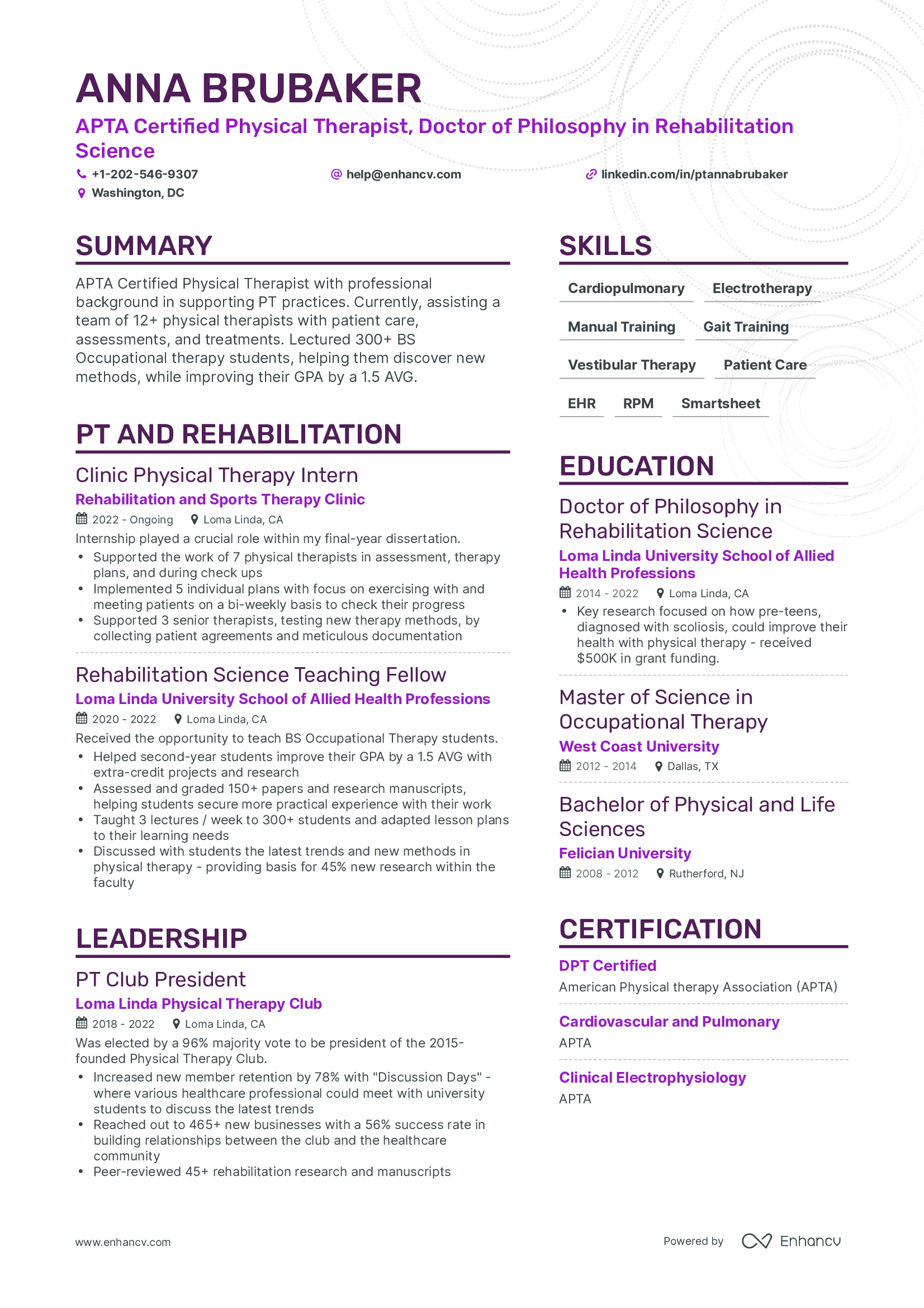
In some industries, a specific certification can be a real game changer to meeting ATS standards.
Dr. Brubaker knows this and that’s why she has used her resume to highlight her American Physical Therapy Association (APTA) certification within various sections (headline, summary, and certification).
Another reason why Dr. Brubaker’s resume works is that it pinpoints her niche of expertise with tangible results.
Her education section not only lists all of her degrees, but she has turned recruiters’ attention to the grant funding her Ph.D. thesis secured (an outcome of the project).
Did you notice how she curated the experience section? Dr. Brubaker started with her more job-oriented responsibilities, followed by a leadership role.
if you’ve participated in any extracurricular activities during your studies, they could indicate various soft skills on your resume, including leadership, initiative, organization, etc.
data scientist, ongoing Ph.D. in statistics
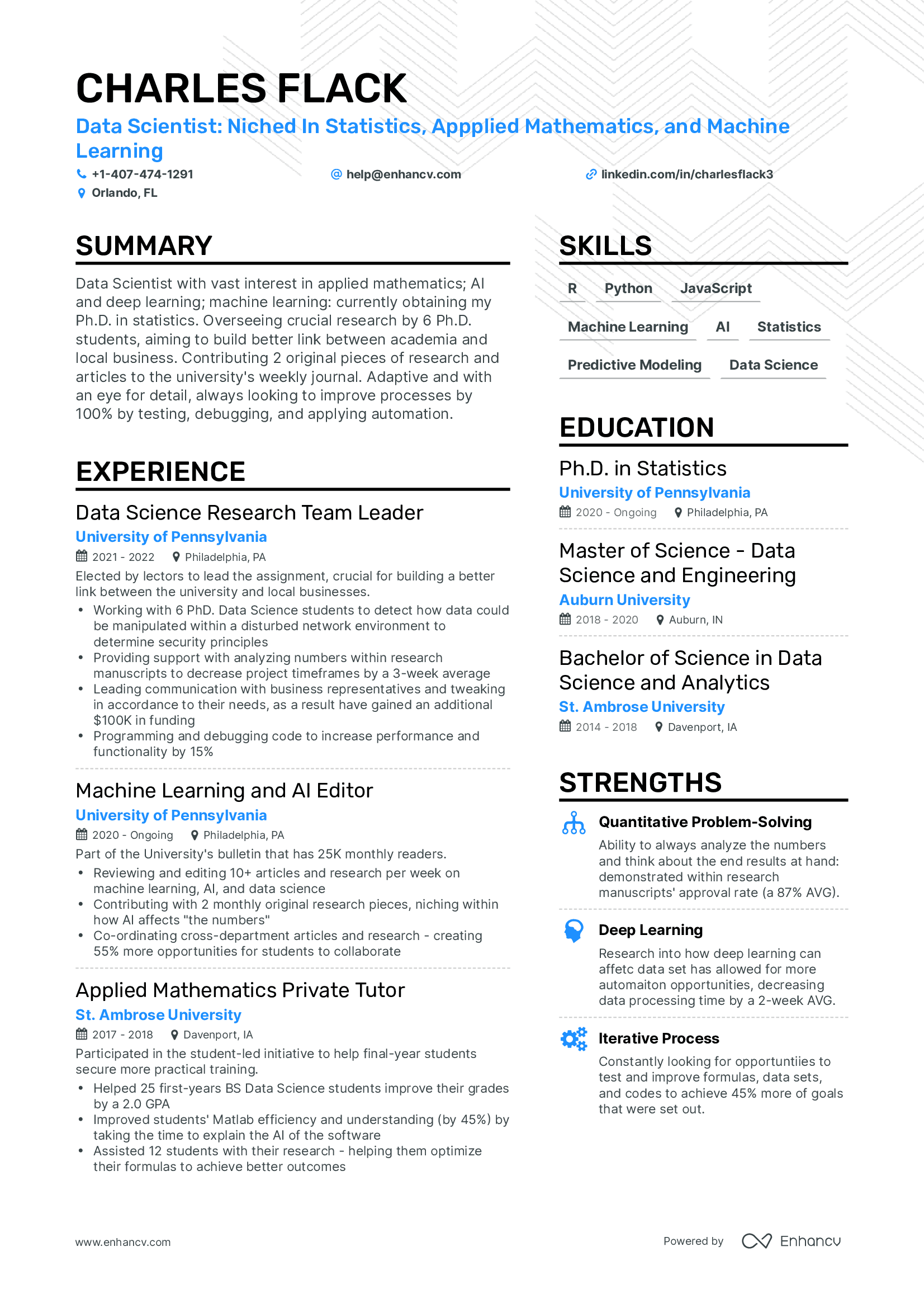
Are you a current Ph.D. student, wondering how to include your ongoing degree on your resume?
Charles Flack’s resume includes some of the best how-to practices.
Charles uses the resume headline and summary’s first section to specify his research niche, which is followed by his ongoing Ph.D. Status.
N.B. Remember that the recruitment process is one of building trust with honesty. If you note in your resume that you’re a Ph.D. graduate (without this being the reality), recruiters will find out.
Continuing with Charles’s resume summary. It goes on to include an array of expertise and soft skills (e.g. leadership, adaptiveness, perfectionism) all within achieved results in academia.
His experience section includes roles in leadership, technical writing, and private tutoring, denoting individual skills and contributions.
The strengths Charles has included are more specific and tie in with data science roles. Those include quantitative problem-solving, deep learning, and iterative process.
21 Ph.D. related resume examples to help you get inspired
- Entry-Level
- Grant Writer
- Lab Technician
- Research Associate
- Research Assistant
- Lab Assistant
- Lab Manager
- Finance Intern
- Data Science Intern
- Entry Level Engineering
- Entry-Level Mechanical Engineer
- Software Engineer Intern
- Nursing Student
- Data Analyst Entry Level
Quick steps to success in writing your Ph.D. resume to get recruiters’ attention
Let's start with a big no-no: your academic CV, the one you used to secure that tenure position, is a No-go. Put simply - it lacks personality .
HRs and the Applicant Tracking System (ATS) need more context to your experience.
Unfortunately, here comes one of the biggest disadvantages you may face, leaving academia. Often, Ph.D. graduates get rejected as they lack practical work experience .
Don't get discouraged. Instead, find a resume format that works for you.
For Ph.D. graduates that have less work experience, we recommend a functional-skill-based format . It will help you highlight your unique skill set and academic excellence.
Also, it'll align your niche area of expertise with the role expectations.
Now that we've settled the formatting debate, let's look at a couple of more quick pointers for your Ph.D. resume.
1. The top one-third of your resume - the resume header and summary - is crucial to getting a high score on the ATS.
That's why you should try to include as many of the advert's relevant requirements within this section.
2. Expand your qualifications and skills within the experience section.
Don't just list plain bullets, but focus on the outcomes of your studies, research, or publications.
How to write your experience bullets:
3. Speaking of impact, detail your accomplishments within your academic work.
Focus on the picture and your research's influence on the scientific field, business/ industry, or communities.
Bonus: Remember to always list all work and academic experience that is relevant to the job you’re applying for.
Your Ph.D. experience can open many doors for you, giving you a front-row seat on the cutting edge of new technologies.
But let's not get ahead of ourselves, here are a couple more bits and pieces to keep in mind when writing your Ph.D. resume.
What recruiters are looking out for in your Ph.D. resume:
- What methodology or technology have you used to prove your research?
- If you've ever led teams, were you able to manage them successfully?
- Would your niche area of expertise contribute to the organizational goals?
- Can you bring to the table more than just theoretical knowledge?
- How fast can you adapt to a non-academic environment and deliver tangible results?
Ph.D. resume's five most important sections:
- Resume header with keywords from the job description
- Resume summary cross-aligning requirements with experience
- Resume experience to expand on the summary
- Education section, listing all diplomas
- Professional achievements in research and publications
Your Ph.D. resume should balance your knowledge with how fast it can be applied in a real-world environment.
That's why you need to be precise about the resume sections you chose to prove your merit.
Mythbusters: Your PhD resume header under the Enhancv microscope
After endless hours of searching different platforms, you've finally found that cancer research position that perfectly matches your profile.
Avoiding all emotional attachment and excitement, you finally decide on the following header:
2 PhD resume header examples
Let’s look at the bright side of things. If the organization would like to get in touch with Dr. Garnett, they'd easily find his contact details .
But on the other hand, he is making one huge mistake: Dr. Garnett isn't taking advantage of the power of the top section of his resume. More specifically - his headline .
This crucial section could provide Ph.D. graduates with an opportunity to include all relevant keywords that could match their profile. And at the same time, tease their professional story.
This may be obvious, but this example works as it shows that Dr. Garnett is not only a Ph.D. graduate, but his specific area of research and interest, which should supposedly match with the role he’s applying for.
A rule of thumb for headers is to never be vague about your research and expertise.
You could list your Ph.D. degree within your resume title so that it’s the first thing recruiters (and the ATS) see.
In the case of Dr. Garnett, his resume title could read “Dr. David Garnett, Ph.D.”.
Our suggestion is to be wary about the organization you’re applying for because if the culture is more informal, this may come off as “pretentious”.
Ph.D. resume summaries: HRs’ favorite instrument for advanced career storytelling
The Ph.D. resume summary is a really useful section for good first impressions and explaining your experience.
The summary can be used to highlight your skills, strengths, and achievements. While telling the story of your professional growth.
We know how important real-world examples are for you.
So, without further ado, here's how Dr. Lucina Collard rewrote her resume summary. And in the end, got the attention of a prestigious software development company.
2 PhD resume summary examples
Dr. Collard may have spent too much time in the lab, as her Ph.D. resume summary just lists what courses she took and her thesis statement.
No results, no outcomes.
In the end, she did decide to include some soft skills and passions, but without actually pointing out the “why” behind her work. This doesn’t make sense at all.
Here’s what her modified resume summary looked like in the end:
This summary works for one simple reason: it qualifies the achievements.
Dr. Collard has noted that within the past 6 years, she has been specializing in the job advert keywords “robotics” and “mechatronics”. The award is also a nice touch to paint the big picture of her experience.
Dr. Collard is apt at achieving results within a dynamic environment. That includes various professionals from different backgrounds.
When talking about her thesis, she goes on to show her familiarity with the process.
Editing Dr. Collard’s summary may seem just like one small step for her, but it’s actually a giant leap to securing an interview.
Making your Ph.D. resume experience section stand out for all the right reasons
When listing their experience section, most Ph.D. graduates are probably making the same mistakes.
The first one: leaving out your academic practice, thinking that recruiters only want to see work experience.
That's not true at all.
Your education would not only prove your technical capabilities, but also your soft skills. But, more on that in the following paragraphs.
The second error: those tricky job titles.
You'd find 1000+ resumes, listing each experience using the given academic titles; e.g. Professor, Lecturer, Post Doctorate Student, Graduate Student, etc.
Robotic vs personalized approach: 1:0.
The ATS, reviewing your resume, is set to recognize keywords that are vital for the job. The faster those appear at the top of your experience, the better.
Instead of listing that you used to be a "Lecturer at XYZ University", go with "Data Science and Machine Learning Lecturer at XYZ University".
Third slip-up: those tricky experience bullets.
Some Ph.D. graduates just list all their courses, research, and publications.
This isn't the way to go.
You should rather align your knowledge with the job description to prove tangible results.
A couple of questions to help:
- What did this course help me learn and achieve that could be applicable to the job I'm applying for?
- How did leading lectures help me to cooperate better within the learning environment?
- What grants did my publications secure for the educational institute?
- What effects did my research have on the big-picture subjects within the field?
- The more you can get into the actuality (and practicality) of your education, the higher your chances are to get your first interview booked.
Let’s look at an example of how your experience can be showcased within your resume as crucial for the job.
Phd resume experience examples.
- • Got PhD in Philosophy
- • Took Philosophy of Mind, Brain, and Behavior Course
- • Took Ethics Course
- • Wrote Diploma on ‘To Be Or Not To Be: The Ethics of The Human Existence In The 21st Century’
This experience section is pretty negligent and robotic. Did you just get a diploma during those three-plus years?
You may be exiting from a leading higher education institution, but putting in the extra effort to your resume shows that you are diligent.
And that you’re actually invested in getting that particular job.
- • Contributed 60+ publications to the university scientific journal, niching within human rights, ethics, and the big why of human existence
- • Peer-reviewed publications for 12+ philosophy colleagues and professionals with a focus on consistency and validity of the thesis
- • Collaborated with 10+ professionals from arts, science, and biotech fields to question and understand the ethics behind their projects
- • Apart from the scientific paper for my final thesis, entitled 'To Be Or Not To Be: The Ethics of The Human Existence In The 21st Century’, published a short video on the university website to help inspire young professionals of philosophy to always stay alert
There’s no ground for comparison between the two examples. But let’s look at some of the basics.
The first experience bullet hints that the professional can write technical papers for their niche.
Next, the candidate showcases an eye for detail, collaboration, and teamwork.
Finally, they have found a way to get their thesis submitted on time and also make it more understandable.
On a side note - did you notice how a better job title could be a complete game-changer?
One bonus tip on better systematizing your Ph.D. experience
General practice is that you'd create one single resume experience section.
But what if while writing your Ph.D. resume, you realize that in the past six years, all your experience is for the same institution?
Here's an idea to spice up your experience section. You can create a couple of experience sections, based on functionality.
Thus highlighting job advert keywords and, at the same time, including more details.
So you could have some of the following headers, under which you could classify your work:
- Research Experience
- Technical Experience
- Analytical Experience
- Leadership Experience
- Mentorship Experience
- Teamwork Experience
- Higher Education Experience
Feel free to align your transferable skills, which would be beneficial for the job you're applying for.
How should you include your degrees within your Ph.D. resume education section?
Here's the advice you've probably been waiting for; introducing…
… "How to write about your degree without sounding like a snob?"
And there are two possible scenarios at play.
The first is that you're applying for a job related to your area of study.
You should list your Ph.D. degree in detail, including research topics, method expertise, and publications.
As you're writing for non-specialized audiences, don't go overboard with the complex terms. Instead, weave keywords from the job requirements within your education section.
In the second case scenario, you're applying for a job that has nothing to do with your degree.
Keep your education section plain and simple with your degree, university/college, dates, and location.
Either way, remember to always list all of your degrees in chronological order, starting with the latest.
This isn't just some made-up rule or HR caprice. Your resume education helps recruiters determine if:
- Your basic training and knowledge would fit the job
- You stayed focused on your coursework and graduated on time
- You would be a good fit for the team. Some companies tend to hire graduates from the same university
Ph.D. in progress: Should you include your potential degree on your resume?
Being transparent on your Ph.D. resume is what builds that fantastic initial relationship with the company you're applying for.
Thus, you have to be very clear and precise, especially in your education section.
If you're still pursuing your Ph.D. degree, shift the focus from the future to what you've achieved so far.
Your education section could answer any of the following questions:
- How applicable your degree is to the job opening?
- Which of the courses you've completed would help the company grow?
- Is your education a stepping stone within your professional experience?
- What is your expected graduation date?
Being on the course to completing your Ph.D. is definitely commendable, but sometimes life happens. And you may be forced to drop out of your Ph.D. education.
Should you then list the degree you didn't complete?
The answer is 100% yes, as your Ph.D.:
- fills gaps within your professional experience
- is valuable experience
- has helped you gain new knowledge
Making it clear to recruiters that your degree is "Incomplete" or that you "Didn't Graduate" is very important.
List your degree, dates, university/college, and status.
If you get to the interview stage, recruiters will ask you why you dropped out. Be prepared to talk about why it wasn't the best option for your career at the time, or hint at the circumstances.
Even if it's hard to believe, HR managers are people - just like you and me - and they are able to show understanding and compassion.
Ph.D. resume: Is there a dream skill set your potential employers would like to see?
Recruiters review your resume to see how your experience aligns with the role, with a big focus on transferrable skills.
Or in other words, what else can you bring to the table to help the business or institution grow?
And transferable skills can be both hard (or technical ) and soft skills .
Your hard skills include the technology you used to complete your studies.
Consider the opportunities you've has to:
- test and measure antennas parameters in an Anechoic chamber
- audit in a lab environment renewable energy sources' efficiency
- develop software, using Python, to patch cybersecurity risks
The list can go and on and on. Your Ph.D. has probably provided you with a pretty solid technical background.
When writing your resume’s separate technical skills section, ever wonder which technology should go first?
Rule of thumb: align the technology within the job description with your expertise.
The more proficient you are at a certain skill, the sooner you should list it.
Wondering what some of the most popular Ph.D. resume hard and technical skills are?
Check out our list, based on some of the most popular industries.
PhD resume technical skills for various roles:
15 hard skills for opportunities in business consulting:
- Knowledge of different business-crucial frameworks, including Benchmarking, Balanced Scorecard, Porter’s Five Forces, The GE-McKinsey Nine-Box Matrix, The BCG Growth-Share Matrix, Core Competencies
- Data Management and Analysis
- Advanced Data Modelling
- Strategy, Planning and Implementation
- Assessing and Managing Risk Using Frameworks
- Statistics and Understanding Correlations
- CRMs: Salesforce, Zendesk, Bitrix24, etc.
- Lead Generation Software: Zendesk Sell, Pipedrive, HubSpot, etc.
- Project Management Software: Jira, Hive, Asana, etc.
- Employer and Customer Satisfaction Surveys
- Proposal Writing
- Scheduling Software: Calendly, Google Calendar, Doodle, etc.
- Revenue Optimization and Sales
15 technical skills for biology, biotech, biochemistry, and medical research:
- Design, conduct, and analyze scientific research
- Tissue Culture
- PCR (Polymerase Chain Reaction)
- Gel Electrophoresis
- Western Blot
- Molecular (Gene) Cloning and various techniques
- Flow Cytometry
- Mass Spectrometry
- Confocal Microscopy
- Cell-Based Assays
- Radioimmunoassays
- Data Analysis in biotechnology, bioinformatics, and medical research
- Laboratory and Equipment
15 engineering technical skills to add to your PhD resume:
- Manufacturing: Forging, Welding, Assembling, etc.
- Quality Control
- Industrial /System Design and Analysis
- Conceptual, Logical, or Physical Data Modeling
- AI and/ or Machine Learning
- Design Tools: AutoCAD, SolidWork, 3dsMax, etc.
- Programming Languages: C++, Python, Java, etc.
- Equipment Diagnosis
- Project Management: Trello, Zoho, Microsoft Project, etc.
- Data Analysis Software: Microsoft Power BI, Tableau, Qlik Sense, etc.
- CNC Programming
- Advanced Physics
- Structural Analysis
- Nanotechnology
15 recommended computer science technologies:
- Programming languages: C++, PHP, Swift, etc.
- Software engineering and development: Atom, GitHub, Chrome DevTools. etc.
- Cloud Platforms
- Data migration and deployment
- Application Programming Interfaces (APIs)
- Integrated Environments Management
- Network Maintenance
- Cybersecurity
- Machine learning AI
- Business Intelligence and Statistical Analysis Tools
- SQL Consoles
- SAS Development and Forecasting
- Data Modelling Tools: ER/Studio, Archi, Ludichart, etc.
- Automation Tools
15 academic and research technical skills:
- Technical Literacy
- Presentation and visual: Tableau, Prezi, PPT, etc.
- Learning platforms: Moodle, Classroom, Teams, etc.
- Surveys: Google Forms, MailChimp, Kahoot, etc.
- Data-Processing Software: SPSS, RStudio, NVivo, etc.
- Academic Networks: Google Scholar, Academia.edu., ResearchGate, etc.
- Academic Research and Technical Writing
- Email Writing
- Data and Information Analysis
- Copyright and License
- Videoconferencing: Zoom, Teams, Google Meet, etc.
- Applications for Securing Grants and Funding
- Peer Reviews and Co-Writing Interdisciplinary Technical Papers
Moving on to your PhD resume soft skills
There's still no precise formula for how soft skills are gained and applied in the workplace.
How many times have you seen an advert that requires "a can-do attitude and teamwork"?
Yet soft skills are on all recruiters' must-have checklists.
In the case of Ph.D. applicants, these transferable skills are built thanks to all the healthy habits you've maintained through your education, including your:
- collaboration
- ability to meet deadlines
Soft skills hint to recruiters more about your character and style of work.
Here are some ideas as to which ones you can include within your resume:
37 PhD soft skills to spice up your resume:
- Critical / Logical Thinking
- Problem-Solving
- Time Management
- Brainstorming
- Creativity and Innovation
- Meeting Deadlines
- Working Under Pressure
- Negotiation
- Project Management
- Organization
- Prioritization
- Flexibility
- Independent Work
- Ethical Decision-Making
- Leadership or Mentorship
- Collaboration
- Teaching or Lecturing
- Conduct Meetings
- Supervision
- Feedback and Evaluation
- Motivating Others
- Communicating Ideas
- Presentation
- Constructive Debating
- Leading or Participating in Group Discussions
- Public Speaking
- Accelerated Learning
- Attention to Detail
- Writing Proficiency
- Quantitative Literacy
- Listening and Reflection
When describing your leadership or mentorship soft skills, here are a couple of questions you could answer within your resume to qualify your achievements:
- What actions did you take to maintain a constant and successful team dynamic?
Mix in extracurricular certificates
Back in the day, you earned a couple of extracurricular certificates and wondering if you should include those on your Ph.D. resume.
Again, it's a matter of analyzing how necessary your certification is for the job.
E.g. if AICPA's CPA certificate is listed as obligatory within the job description - and you have earned yours - you know what to do.
Certificates show that you're willing to put in the extra effort to stay relevant. Proving that you're committed, flexible, and a life-long learner.
So, think about the relevancy the certificate would have within your field.
Then, consider including some of these popular certificates:
Top 50 PhD certificates from various institutions for your resume:
- Association of Clinical Research Professionals (ACRP) - Certified Professional
- ACRP - Clinical Research Associate Certification
- ACRP - Clinical Research Coordinator Certification
- American Health Information Management Association - Coding Specialist Physician-Based Certification
- Nationally Registered Certified Patient Care Technician
- National Healthcare Association (NHA) - EKG Technician Certification
- NHA - Phlebotomy Technician Certification
- NHA - Clinical Medical Assistant Certification
- American Association of Medical Assistants - Medical Assistant Certification
- Red Cross - Nursing Assistant Certification
- Behavior Analyst Certification Board, Inc. - Registered Behavior Technician
- American Association of Professional Coders - Certified Professional Coder
- Pharmacy Technician Certification Board - Certified Pharmacy Technician
- Society for Clinical Data Management - Clinical Data Manager
- American Medical Writers Association - Medical Writer Certified
- Board of Editors in Life Science - Board-Certified Editor in Life Science
- International Society for Medical Publication Professionals - Certified Medical Publication Professional
- Regulatory Affairs Professional Society - Regulatory Affairs Certification
- Google Project Management Professional
- Society of Petroleum Engineers - Petroleum Engineering Certification
- American Institute of Chemists - National Certification Commission in Chemistry and Chemical Engineering Certification
- Coursera - Software Engineering MasterTrack Certificate
- Cisco Certified Network Professional in Service Provider Operations
- CompTIA Security+ Certification
- (ISC)² Certified Information Systems Security Professional
- American Society for Quality (ASQ) - Quality Engineer Certification
- ASQ - Reliability Engineer Certification
- Advanced Certificate Program in CFD-Aircraft Aerodynamics
- Engineer in Training License and Certification
- Society of Broadcast Engineers - Certified Audio Engineer
- Association of Technology, Management, and Applied Engineering - Certified Technical Professional
- International Council on Systems Engineering - Systems Engineering Professional Certification
- American Academy of Project Management - Certified Planning Engineer
- Heating, Ventilation, and Air Conditioning Master Specialist Certificate
- iNARTE Electromagnetic Compatibility Designer Engineer Certificate
- American Academy of Environmental Engineers and Scientists - Board Certified Environmental Engineer
- American Public Power Association - Key Accounts Certificate Program
- Global Association of Quality Management - Certified Agile Developer
- Environmental Protection Agency - Operator Certification Program Management
- Institute of Management Accountants - Certified Management Accountant
- National Association of Certified Public Bookkeepers - Certified Bookkeeper
- Association of International Certified Professional Accountants - Certified Public Accountant
- Chartered Financial Analyst Institute - Chartered Financial Analyst
- Internal Revenue Service - Enrolled Agent
- The Institute of Internal Auditors - Certified Internal Auditor
- Association of Certified Fraud Examiners - Certified Fraud Examiner
- National Association of Sales Professionals - Certified Professional Sales Person
- Institutes of Management Consulting - Certified Management Consultant
PhD resume: let’s get creative with a few more resume sections
When completing your Ph.D. resume, you should always find ways to stand out from the crowd.
That’s why we’ve compiled for you some of the most popular sections which you could add to your resume.
Before doing so, always question each section's relevance to the job you're applying for.
- Publications or Projects - focus on topic, methodology, and impact; include your grant ID code, if your research won any funding
- Academic Awards - once more, consider if those would shine a better light on your expertise
- Conference Presentations - this would showcase your public speaking abilities
- Language Skills - be honest when listing your language proficiency
One final word of warning - your Ph.D. resume offers limited space to showcase your expertise, so try to make the most out of it.
key takeaways
- The extra effort to align your Ph.D. skills with the job you're applying for always gets recruiters' attention.
- Include as many relevant keywords within the header and summary of your Ph.D. resume.
- Have separate sections, detailing how your academic background has helped you attain experience, skills, and certifications.
- List chronologically all degrees you've earned through your education, with an adaptable approach to details.
- Remember that the recruiters or the ATS assessing your resume may not be that scientifically literate. Substitute complex terminology with impact and results.

Looking to build your own PhD resume?

- Resume Examples
What to Do When I Forget to Attach My Resume
How to show promotion on resume: examples & guide, should you add unrelated work experience on your resume, the best quotes to use on your resume, 8 common interview questions for managers (with answers), how to answer "what is your management style" in a job interview.
- Create Resume
- Terms of Service
- Privacy Policy
- Cookie Preferences
- Resume Templates
- AI Resume Builder
- Resume Summary Generator
- Resume Formats
- Resume Checker
- Resume Skills
- How to Write a Resume
- Modern Resume Templates
- Simple Resume Templates
- Cover Letter Builder
- Cover Letter Examples
- Cover Letter Templates
- Cover Letter Formats
- How to Write a Cover Letter
- Resume Guides
- Cover Letter Guides
- Job Interview Guides
- Job Interview Questions
- Career Resources
- Meet our customers
- Career resources
- English (UK)
- French (FR)
- German (DE)
- Spanish (ES)
- Swedish (SE)
© 2024 . All rights reserved.
Made with love by people who care.
- Resume Writing
- Resume Examples
- Cover Letter
- Remote Work
- Famous Resumes
- Try Kickresume
CV for PhD Application: How to Write One Like a True Scholar (+CV Example)
- Klara Cervenanska ,
- Updated March 13, 2024 11 min read
A PhD is the highest level of academic qualification you can achieve. To secure your position, however, you first need an impressive CV for your PhD application.
Earning a PhD degree requires you to produce extensive research in a narrowly defined subject within a certain discipline and to make a considerable original contribution to your field.
Hence why PhD programs are always very selective. The admission rates hover around 10% and only about half of the admitted candidates actually finish the degree, according to a recent psychology research .
As a result, less than 1% of the population attains a PhD.
So, how do you become a part of the 1%?
The process of attaining a PhD starts with a strong application which includes an impressive academic CV .
A CV for PhD application needs to be carefully crafted, well formatted, and contain specific sections.
We'll show you how to craft a stellar PhD application CV, and a sample academic CV from a real person admitted to a PhD program in France.
Table of Contents
Click on a section to skip
What is an academic CV?
What to include in an academic cv for phd application.
- How to write an academic CV for a PhD application?
Tips on how to write a CV for PhD application
How to tailor your cv for different phd programs, phd cv example.
First, there are two types of career documents job seekers widely use. A resume and a Curriculum Vitae (CV).
These two documents are similar but not identical.
So, let's have a look at the key differences between a CV vs a resume :
- A resume is used when applying for a position in industry, non-profits, or the public sector. It should focus on skills and past experience while being tailored to a specific job position. The length of the document shouldn't be more than 1 or 2 pages.
- A curriculum vitae (CV) is used when applying for positions in academia, science, or medicine. It focuses on education, research background and scholarly accomplishments. Finally, its length depends on the number of references, publications, etc.
There are even more types of CVs. A general CV, an industry (professional) CV, or an academic (research) CV — which is exactly the one you'll need.
In a nutshell, an academic CV is a career document that provides extensive information about your educational and research background. Scholars and researchers use this document when applying for jobs in academia — such as a PhD application.
Lastly, an academic resume is a term you can often come across, too. To avoid any confusion, it's the same as an academic CV. A more appropriate term is, however, the latter.
Rules are important in academia. That's why all academic CVs usually follow pretty strict structures regarding their content and formatting.
First, let's have a look at the resume sections you should include in a CV for PhD application:
- Contact information. Include your full name, email, phone number, and location.
- (Research) objective. A concise, brief paragraph outlining your research plans and strategies.
- Education. It should form the bulk of your CV and detail you educational background.
- (Research) experience. Your research experience can often set you apart from other candidates.
- Publications. Include anything from journal articles, published reports, to your research dissertation.
- Awards. Mention all awards and accomplishments you’ve received in reverse chronological order.
- Skills. These should be relevant to the PhD project or show that you have what it takes to succeed as a researcher.
- References. Finally, try to include at least two references, such as your dissertation supervisor and one other member of staff.
Let's have a closer look at each of the 8 CV sections in the next chapter.
How to write an academic CV for a PhD application ?
Applying for a PhD will be a lot less stressful if you follow this quick guide on how to write a CV for a PhD application:
You should always start your CV or your resume by providing your contact details to form the CV header . Include your full name, your professional email address, and your mobile number. Additionally, you can include your location. However, we don't advise including your full home address for privacy reasons. Entering the country and city you reside in is usually enough. Since a CV is a bit different than a resume, we don't recommend including links to your social media .
Research objective is basically a brief paragraph at the beginning of your CV outlining your research plans, interests, and strategies. It paints a picture of you as a person and will guarantee that the admissions committee will be interested in reading and learning more about your professional background. Your research plans and strategies should align with the PhD project you're applying for. Hence, read the project description carefully and make sure to tailor your objective accordingly. Ideally, without making stuff up.
The education section should form the bulk of an academic CV. No one expects a potential PhD candidate to have 10 years of experience in the field. But what's expected is an appropriate educational background. A common practice is to list your education in a reverse chronological order. This means listing your Master's degree first and then a Bachelor's degree. For each degree, provide the full name of the degree, the type, its duration, the relevant courses and modules, the corresponding (or expected) marks, GPA , and any relevant projects or presentations. Also, include the name and the description of your final year dissertation project.
In this section, introduce all of the research projects you worked on, whether they were a part of your undergraduate degree, your master's degree, or you have undertaken this project elsewhere. You can include any voluntary , part-time , or full-time work experience you deem relevant for the PhD project of your choice. For instance, skip the part-time bartending job and rather include a teaching experience or a voluntary project you undertook.
Of course, it's okay if you don't have any publications yet. If that's the case, simply skip this section. However, if you do have any work published at this stage, list it in this section. The publications can include anything from journal articles, published reports, contributions to peer-reviewed journals, or an adaptation of your dissertation project. Make sure to check the citation style your institution or field prefers and use it consistently in your publications section. The most common ones are APA, MLA, and Chicago.
In this CV section, list relevant honors, achievements, or awards you earned for going beyond average — again in reversed chronological order. It includes scholarships, university fellowships, competitions, work-related awards, or academic awards . For instance, you can mention a very high GPA, subject-specific awards, or any grants you received. However, keep in mind that mentioning how much money was involved is only common in scientific fields.
The skills you mention in your academic CV should be relevant to the PhD project you're applying for or show that you have what it takes to succeed as a researcher. Between the two types of skills , hard and soft, hard skills are more appropriate to include in your CV for PhD application. Examples of hard skills include Python, data analysis, polymer synthesis, C++, Chem Draw, Ahrefs , languages, or other computer skills . However, completing a PhD degree usually also involves demonstrating your teaching abilities. For this reason, listing soft skills such as a good oral communication and presenting is also a good idea.
While a references section in a regular resume is pretty much redundant, in a CV for PhD application it's a must-have . Why? Well, having a person attest to your skills and achievements is a great way to leverage your professional experience. The person you ask should be articulate and in a reputable position. Your best bet is to ask your dissertation supervisor, a professor you had a good relationship with, or one who taught the subject most relevant for the desired PhD program. Finally, don't forget that your references have to agree with having their contact information shared, first. Read our quick guide on how do you ask someone to be your reference .
Apart from making sure the content of your CV is spot on, you should also follow some well-established formatting tips.
A clear layout and composition ensure your CV is professional and easy to read.
Here are a few tips to help you achieve that:
- Keep the formatting consistent. If you choose a certain font type and size, stick to it. The same goes for margins, spacing, and capitalization.
- Less is often more. It might be tempting to use bolding, italics, or underlining in order to make the document "easy" to read. However, an excessive use of these features actually has the exact opposite effect.
- Avoid long paragraphs. A CV is all about providing objective facts regarding your professional background. Hence, no need to provide generic statements or go into too much detail. And if you happen to write more text, you can always divide it using bullet points.
- Use professional language. It goes without saying, but don't use slang. Similarly, use professional jargon and abbreviations within reasonable limits.
- Don't limit yourself to one or two pages. The length of your academic CV depends on the number of publications, awards, references, and experiences. Unlike a resume, a CV is a complete summary of your academic and professional background.
- Convert your CV to PDF. Doing this considerably reduces the risk of compatibility and formatting issues. A PDF file keeps your formatting intact across various devices.
Too much to keep in mind? Kickresume's CV & resume builder can save you the headache and provides useful templates with appropriate formatting designed by career professionals.
When applying for different PhD programs, it's crucial to tailor your academic CV to suit each specific program.
This doesn't just improve your chances of catching the eye of admissions committees ; it demonstrates your genuine interest and alignment with their goals.
To effectively tailor your CV for different PhD programs, follow these three tips:
#1 Understand program requirements and values
How do you do that? Start with in-depth research about the PhD program:
- Visit the program's website
- Look at the curriculum
- Attend open days
- If possible, reach out to alumni
Once you have a clear picture of the program's values and requirements, you can begin to customize your CV.
For example: If a program emphasizes community outreach, you might highlight your involvement in science education for underprivileged youths or your participation in community-based research projects.
This demonstrates not only your alignment with their values but also your active contribution to areas they care about.
#2 Emphasize transferable skills for PhD programs
This applies to people switching fields or applying to a program that isn't a direct continuation of your undergraduate degree.
Let's say you're moving from a background in chemistry to a PhD in molecular biology.
It's crucial to highlight how your analytical skills, understanding of chemical processes, and any lab work or research experience directly apply to molecular biology.
For instance: Discuss your experience with techniques that are common in both fields, like chromatography or spectrometry, and how they've prepared you for the research you aim to conduct in molecular biology.
Tailoring your CV in this manner demonstrates your ability to bridge different disciplines and apply your skills in new contexts.
#3 Adapt your CV for international PhD programs
Adapting your CV for international programs involves more than just translating it into another language.
Start by researching the academic culture and CV formats preferred in the country you're applying to. This might include:
- the preferred length
- whether to include personal information such as a photo
- emphasis on certain types of experience or qualifications
For instance: in some countries, a detailed list of courses and grades might be important, while in others, a focus on research experience and publications is key.
Websites of the target universities, country-specific academic career resources, advice from current international students, or even online forums like Reddit are invaluable for this purpose.
Finally, to help you tie everything we talked about together, we thought one picture is worth a thousand words.
Here's a CV sample from a person who managed to get accepted into a PhD program at the university of Lyon in France.
There are several things Herrera included to ensure her CV was successful:
- A complete professional and academic background. We can see that this section forms the bulk of the resume. As it should.
- Plenty of hard skills. Herrera included 7 hard technical skills and multiple languages. All of these skills are very valuable in academia.
- A succinct description of all projects. She includes the full name of the projects, their duration, and theme.
- References, publications, and certifications. All of these sections are included in the full version of this resume and can be found by clicking the button below the sample CV.
Lyon University PhD Student Resume Sample
This resume sample was contributed by a real person who got hired with Kickresume’s help.
Klara graduated from the University of St Andrews in Scotland. After having written resumes for many of her fellow students, she began writing full-time for Kickresume. Klara is our go-to person for all things related to student or 'no experience resumes'. At the same time, she has written some of the most popular resume advice articles on this blog. Her pieces were featured in multiple CNBC articles. When she's not writing, you'll probably find her chasing dogs or people-watching while sipping on a cup of coffee.
Related Posts
Cover letter vs resume: 7 key differences and the art of writing them (+examples), resume format: what’s the best resume format for 2024 (+resume templates), share this article, join our newsletter.
Every month, we’ll send you resume advice, job search tips, career hacks and more in pithy, bite-sized chunks. Sounds good?

- How to write an Academic CV for a PhD Application
- Applying to a PhD
- The purpose of an academic CV for a PhD application is to provide a summary of your educational background and demonstrate the research skills and relevant experience you have that make you capable of undertaking a PhD.
- It should be divided into nine sections : (1) contact information, (2) research interests, (3) education, (4) research and work experience, (5) teaching experience, (6) relevant skills and experience, (7) publications and conferences, (8) professional memberships, (9) referees.
- It should ideally be up to two pages for a new research student, but can extend up to four pages if required.
- The smaller details matter more than you think – write concisely, use consistent formatting, avoid jargons and general statements, check spelling and grammar, and have at least one academic to proofread it for you, ideally in the same area you are applying to.
Introduction
So you are nearing the end of your current degree or making a return to education, and you’ve decided to make your next step a PhD. While the road ahead will be filled with much excitement, you’ll need to secure your position first. This will all begin with a strong PhD application and an equally impressive academic CV and personal statement or cover letter.
Together with your personal statement or cover letter, your CV will show who you are as an individual and what you have to offer. It needs to be concise, correctly formatted and well written to convince your preferred university and supervisor that you are the right student for the project.
This step-by-step guide will get you on your way to creating an outstanding academic CV for your next PhD application. We’ll discuss the sections your CV should be structured into, what each of these sections should include, and how it should be written. We’ll also give you valuable tips that are sure to get your readers’ attention.
What Is an Academic CV?
When applying for a PhD position, it’s common for the university to request a curriculum vitae (CV) from you to accompany your application.
An academic CV may appear similar to a standard CV used for job applications, but they are two relatively unique documents.
Where a standard CV focuses mostly on what your previous responsibilities have been and what you have accomplished to date, an academic CV concentrates on your academic background, achievements and experiences . Your academic CV will be used by a PhD supervisor to determine whether you can meet the challenges associated with undertaking a demanding PhD research project, as not everyone can.
How to Write an Academic CV for A PhD Application
A good academic CV should be broken into nine section headings:
- Contact Information
- Research Interests / Personal Profile
- Research and Work Experience
- Teaching Experience
- Relevant Skills and Experience
- Publications and Conferences
- Professional Memberships
- Referees / References
Below, we discuss what each of these sections should contain and how they should be written.
1. Contact Information
Start your CV by providing your contact details. All of the following should be included:
- Full name – Your name should be your document title, formatted in bold and centralised text.
- Email address and contact number
- Location – Your town/city and country, e.g. ‘Birmingham, UK’, will be sufficient; it’s not necessary to provide your full home address.
- Profiles – Include a link to any professional profiles you may have, such as LinkedIn or ResearchGate.
NOTE: Some individuals include a profile photo but be careful before doing so. While this would be expected in some countries such as those in Asia, the Middle East and Africa, this would not be the case in other countries such as the UK and US. This is because it can lead to complications with labour and anti-discrimination laws and potentially cost you your application. We therefore strongly advise you to look into the norms and regulations of the host country before deciding to do so.
2. Research Interests / Personal Profile
For an academic CV written for a PhD position, your ‘research interests’ section will double as you ‘personal profile’. As a brief introduction to yourself, this will be an important section as it sets the first impression of you for the reader.
Use bullet points or a brief paragraph to summarise who you are, your relevant qualifications, your research interests and your relevant skills and experience. When writing this section, your focus should be on two aspects: demonstrating your ability to conduct a PhD and your enthusiasm for the project .
To create an impactful research interests’ section, adhere to the following:
- Tailor to each research project you apply for: One of the easiest ways to do this is to read the project description attached to the PhD advert, identify two to three of the most prominent keywords, and incorporate them into your writeup.
- Keep it short: This section is only an introduction, so keep it concise and punchy over long and detailed; 50 – 60 words is a good target.
- Make every word count: As 50 – 60 words isn’t much, be as specific as you can. Avoid clichés such as “I am committed to research and have a high attention to detail” at all costs; not only are they generic and overused, they also don’t provide the reader with any useful insights into you.
3. Education
A PhD CV is all about academic achievements and qualifications, so your education section should be given high importance and form the bulk of your CV, especially as it will be used to determine if have the core skills required for the position.
Working in reverse chronological order, provide a breakdown of your current academic qualifications. For most of you, this will be an undergraduate Bachelor’s degree and a postgraduate Master’s degree.
When listing your qualifications, provide the full name of the degree, the degree type, and the duration in terms of its start and end year. You do not need to limit this to your past qualifications; if you’re currently studying or taking an external course, include them as well, but state that they are ongoing and provide an expected grade if you have one.
If your degree is relevant to the PhD project you are applying to, include a list of the modules you completed and your corresponding marks; the same applies to your final year dissertation project.
Note: If you list your relevant modules, streamline their names by removing any course codes. For example, “FN01 Fluid Dynamics” should become “Fluid Dynamics”. Course codes are only used for internal purposes, and each university will have its own system, so remove them to avoid any possible confusion.
Feel free to also list your GCSEs, A-Levels or other relevant academic qualifications if applicable to the field you are applying to, however, this isn’t necessary, and most supervisors will not ask for them. The exception to this is if your university degree is not directly related to the project you are applying for, but your previous qualifications are. In these cases, include them to help demonstrate the suitability of your academic background.
Finally, list any honours, awards and prizes that you have won or any other notable academic achievements that will help to strengthen your application.
4. Research and Work Experience
Your research and relevant work experience is just as, if not more, important than your educational background. This is because most applicants applying for the position will have similar qualifications, so your research experience can often be the deciding factor when all other things are considered equal.
Your research experience may include both paid and voluntary, full-time and part-time work, as well as university project work. However, in all cases, the experience you mention should be relevant to the project you are applying for or have helped you develop skills that make you a more capable researcher. For example, it’s not necessary to mention your time in retail, but any previous time as a laboratory or teaching assistant or teaching support absolutely will be.
If you any discuss research that you have done as part of your studies, present them as individual project listed in reverse chronological order, as before. You can also include research projects you are currently working on, regardless of how developed they are.
When discussing any projects, include the following:
- What the project was about,
- What research methods you used,
- The skills you gained,
- Any notable achievements or outcomes.
5. Teaching Experience
Since one of the main career paths after a PhD is an academic career, teaching experience can significantly strengthen your academic CV. However, it is generally accepted that not all applicants will have teaching experience, but if you do, include it here.
When discussing your teaching experience, state what level it was at, e.g. undergraduate or postgraduate, and what it involved, i.e. marking, teaching, supervising or organising.
6. Relevant Skills and Experience
This section should describe all other skills and experiences that will help strengthen your application.
They should be specific to the PhD project or demonstrate your potential to become a competent researcher. This includes:
- Technical skills and experience, e.g. the use of computer software packages or research equipment common to the project you’re applying for.
- Non-project specific courses you’ve sat, e.g. an academic writing and communication course.
- Languages you know with their proficiencies noted.
7. Publications and Conferences
Most students won’t have academic publications, but if you do, list them here. Formal publications can include anything from journal articles, which is most likely to an adaptation of your final year dissertation project if you do have one, and published reports. If you have these, list them in reverse chronological order using the reference system adopted by the university you are applying to, as this is what the PhD supervisor will most likely be used to.
If you aren’t a published author or co-author, you can still include other text publications that you may have been involved in, such as online articles, magazines, newsletters and blogs. The topics of these publications should relate to your field or academia in general and be written in a formal tone that showcases your critical thinking and writing skills.
If you’ve ever given a conference presentation, include it here with details of the name, date and location of the conference, the title of your presentation and a summary of what it was about.
Even if you haven’t presented in conferences, you should still list any you have attended, including any seminars or talks. This is a useful way to illustrate your interest in the subject and your commitment to gaining new knowledge within your field.
TIP: If you haven’t attended many conferences or seminars, consider attending several upcoming ones relevant to the research area you’re interested in. Not only is this a great way to learn more about the field in terms of its latest developments and gaps, but it can also be an effective way to make your academic CV more relevant if it’s currently light on research experience.
8. Professional Memberships
Being affiliated with an academic group, society or professional body demonstrates your enthusiasm for your field and for connecting with other like-minded individuals within the community.
When listing these, include the name of the group, the associated membership dates and the position you have held within it.
9. Referees / References
Your references will form the last section of your academic CV.
Your PhD application should specify the number of referees you should include, but if it does not, try to include at least two, but ideally three.
Two of the referees should be academic, with most students choosing their personal tutor and their final year’s dissertation project supervisor. It can be other staff members, but the essential requirement is that it is someone who knows you well enough to be able to substantiate your abilities and character.
If you don’t have two academic referees, you can use a professional referee as long as they are still relevant to the project you are applying for. This will most likely be the case for those who have worked in industry for some time before deciding to return to education.
When creating your reference list, list your referees in order of relevance and how well they know you, not in alphabetical order. This is so if only the first referee is called upon, it will be the individual who can provide you the most useful reference. The following information should be provided:
- Professional title,
- Name of current university,
- Phone number and email address.
It’s imperative that you first seek permission from the individuals before listing them as a referee. It would also be beneficial to send them a copy of your CV, cover letter and application form so they can familiarise themselves with the broader details in case they are called upon.
Tips for Creating a Standout Academic CV
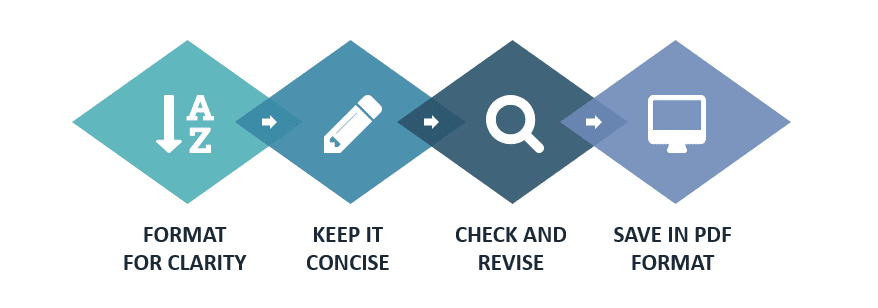
No matter how impressive your academic achievements are or how much experience you have accumulated in your field, the PhD supervisor may never find out if your CV is too difficult to read. With this in mind, here are a few tips for achieving a high degree of clarity:
Formatting for Clarity
- Highlight key information through the use of bolding, italics and underlining, but be careful not to overdo it so that it loses its purpose.
- Keep your formatting consistent throughout, such as indentations, font type and font size, vertical spacing and margins.
- Insert page numbers on each page.
- Avoid jargon and abbreviations to maximise clarity.
- Avoid splitting sections across two pages.
Keep It Concise
- Try to limit your CV to two pages and not more than four. If you need to go over two pages, make sure the most important information is on the first two pages.
- Avoid dense paragraphs, overly long sentences and generic statements. The aim is to pass on essential information in a way that doesn’t require the reader to have to extract it themselves. This leads to the next tip,
- Use bullet points whenever possible, they’re easier to digest than paragraphs.
NOTE: Remember that you will also submit a cover letter or personal statement alongside your CV, so don’t feel the need to cover everything to a high level of detail here as you will have the opportunity to do so elsewhere.
Check and Revise
- As a rule of thumb, the academic CV you submit as part of your PhD application should be the third or fourth version you produce. Try to keep a day or two between each version so that you always approach it with a fresh perspective.
- Proofread for any spelling and grammar mistakes. Although this will seem like we’re stating the obvious, a small mistake can be enough to jeopardise your chances considering that there will be many other high-profile candidates for the supervisor to choose from.
- Have your document checked, first by an academic such as your tutor, and second by a professional proofreader or by an advisor from your university’s careers team. The former will check for technical issues, the latter for common curriculum vitae formatting, spelling and grammar mistakes.
Save in PDF Format
If the submission method allows for it, convert your CV to PDF format. This significantly reduces the likelihood of compatibility and reformatting issues when opened by the supervisor.
Finding a PhD has never been this easy – search for a PhD by keyword, location or academic area of interest.

Browse PhDs Now
Join thousands of students.
Join thousands of other students and stay up to date with the latest PhD programmes, funding opportunities and advice.

Build my resume
- Resume builder
- Build a better resume in minutes
- Resume examples
- 2,000+ examples that work in 2024
- Resume templates
- 184 free templates for all levels
- Cover letters
- Cover letter generator
- It's like magic, we promise
- Cover letter examples
- Free downloads in Word & Docs
3 PhD Resume Examples Made to Work for 2024
PhD Student Resume
Phd application resume.
- Write Your PhD Resume
With the role of a PhD student, you’re the intellectual powerhouse driving groundbreaking research and contributing to the advancement of knowledge. Your expertise allows you to dive deep into complex subjects, developing innovative solutions and pushing the boundaries of what’s already known.
At the same time, you’ll need to balance your responsibilities as a teacher as well, imparting your knowledge to the undergraduates at your institution. Crafting a resume and creating a cover letter that demonstrate your ability to shine in this diverse role is no easy task.
Luckily, we’re here to guide you through the maze of showcasing your academic journey. With our varied PhD application resume examples , you’ll find the ideal resume template to help you craft your own winning resume in no time.
or download as PDF
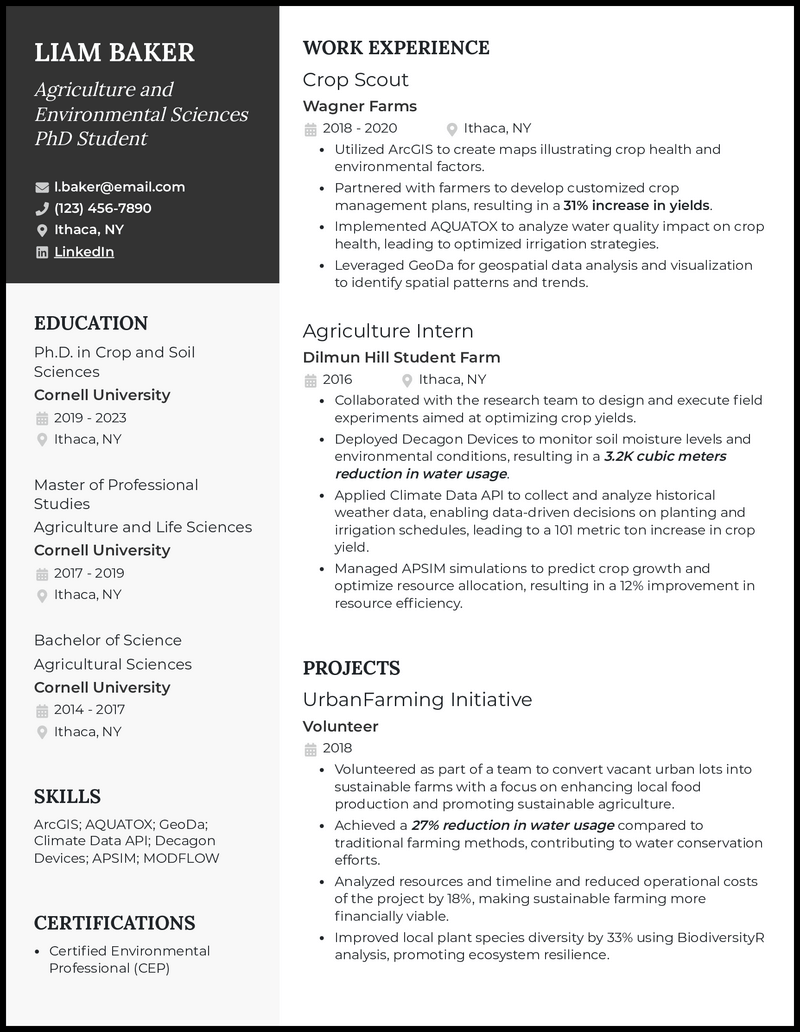
Why this resume works
- Thankfully, Liam does a great job highlighting his internship and project achievements and how both are applicable in helping sustainably improve production.

- One strategy you can use to boost the chances of your PhD student resume to clinch an enrolment slot into the health sciences department is by harnessing the achievements from a volunteer project that brought screening services to a marginalized community.
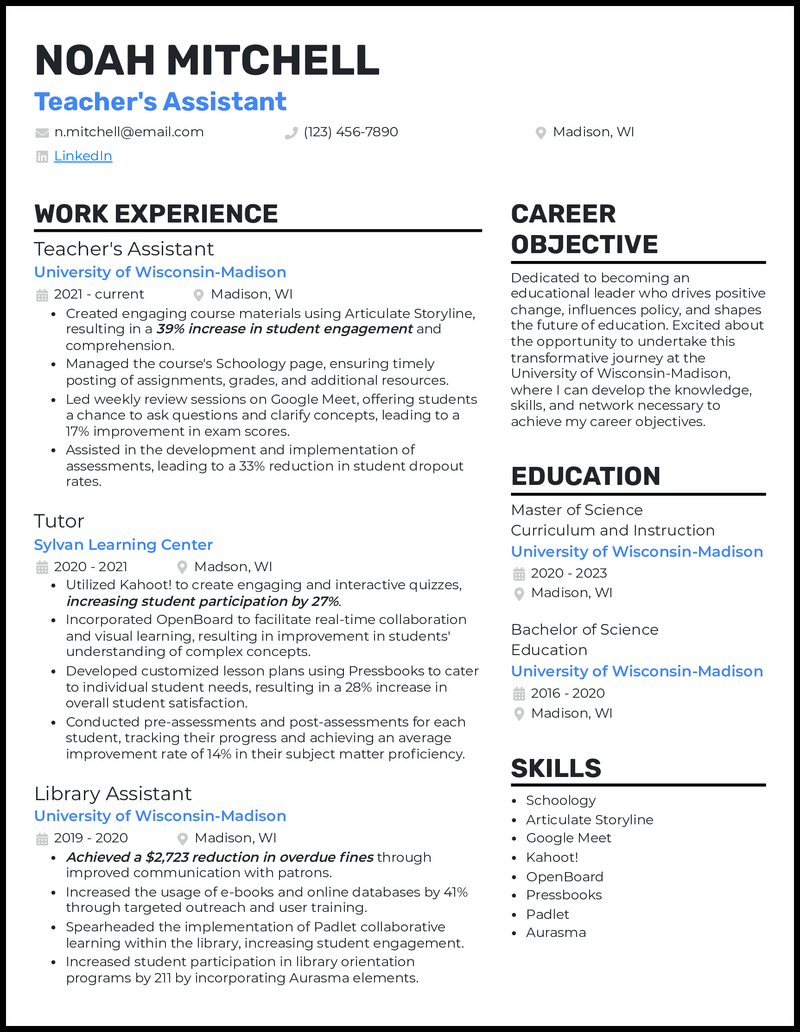
- Therefore, achievements in increasing student participation and engagement accompanied by metrics in improved grades and assessment scores would go a long way to prop your suitability.
Related resume examples
- Research assistant
Adapt Your PhD Resume to the School You’re Applying to

As an aspiring PhD student, your resume is your scholarly calling card, showcasing the intellectual artillery you bring to the academic battlefield.
This is where you can showcase your skills and express why you’re the right person to join the program. To do this, tailor your skills section to align with the specific requirements of your desired program and department.
Highlight your expertise in research methodologies, statistical analysis, and any specialized software or equipment you’ve mastered. For the more technically inclined, don’t shy away from showcasing hard skills like Python, Matlab, Java, or Tableau.
You can also include a couple of soft skills because they’re essential for giving lectures and mentoring students. Just remember to reinforce them with demonstrable examples in the experience section later.
Want some pointers?
15 top PhD skills
- Microsoft Office
- Google Sheets
- Research Methodologies
- Academic Writing
- Public Speaking
- Lesson Planning
- Grant Proposals
- Grading Essays
- Collaborative Research
Your PhD work experience bullet points
From conducting groundbreaking research to publishing papers, your journey as an academic is about more than just the day-to-day grind. In the experience section of your resume, the real spotlight should be on your transformative contributions.
If this isn’t your first PhD, highlight achievements from your previous studies like securing research grants, publishing impactful papers, or successfully leading research projects. If you’re moving up from postgraduate studies, highlight the best and most impressive accomplishments from your master’s and bachelor’s degrees.
Add some numbers to make your accomplishments pop. This could be the number of students mentored, successful experiments and research projects, or the reach of your published work.
- Highlight the number of your articles or research papers that were published in reputable journals.
- Quantify the success of research projects with metrics such as project scope, budget management, or studies carried out.
- Demonstrate your ability to secure research funding by specifying the number and value of grants obtained.
- Showcase your impact as a mentor or tutor by talking about the number of students you’ve guided or the way they were able to improve their grades through your help.
See what we mean?
- Created engaging course materials using Articulate Storyline, resulting in a 39% increase in student engagement and comprehension
- Managed EHR software to document patient assessments, vital signs, and medication administration, maintaining 99.99% accuracy in recordkeeping
- Partnered with farmers to develop customized crop management plans, resulting in a 31% increase in yields
- Assisted in the development and implementation of assessments, leading to a 33% reduction in student dropout rates
9 active verbs to start your PhD work experience bullet points
- Innovated
- Collaborated
3 Tips for Writing a PhD Resume With Little Prior Experience
- Mention your involvement in conferences and workshops. This will showcase your ability to engage with and contribute to the broader scholarly community.
- Echo your passion for knowledge throughout your resume, and look into the future. Outline your career objectives , illustrating your commitment to making a lasting impact through your PhD studies.
- Any and all academic achievements look great on a PhD resume, so make sure to add them. Talk about your GPA, awards won, or competitions you’ve participated in to show your drive as a college student.
3 Tips for Writing a PhD Resume for Your Second PhD
- Research is often independent, and academics are sometimes considered lone wolves. That’s why it’s important to emphasize your leadership and collaboration skills explicitly. The school needs to know you can mentor students and collaborate with other colleagues effectively—so turn up the enthusiasm for this area!
- If you’re going for a research role, it’s essential to be at the forefront of your field—following all the latest papers and studies. You can show this by mentioning your participation in research initiatives or the conferences you like to attend.
- Show that you put just as much effort into your students as you put into your research by sharing student performance and engagement metrics. You can also discuss your favorite lecture and seminar-planning techniques to convey your passion and commitment.
Absolutely! While not mandatory, a tailored career summary can be a powerful tool. Customize it for the PhD position, mentioning the specific program and academic role. Don’t forget to highlight things like research methodologies, data analysis, and any unique contributions to your academic field.
Choose a clean and professional format that prioritizes your academic achievements and research experience. Use clear headings, bullet points, and a consistent structure, much like you would in a research paper.
Include skills that align with the specific requirements of the PhD program and your academic discipline. Highlight technical and soft skills relevant to research, teaching, fieldwork, and collaboration.

- Undergraduate Students
- Masters Students
- PhD/Doctoral Students
- Postdoctoral Scholars
- Faculty & Staff
- Families & Supporters
- Prospective Students
- Explore Your Interests / Self-Assessment
- Build your Network / LinkedIn
- Search for a Job / Internship
- Create a Resume / Cover Letter
- Prepare for an Interview
- Negotiate an Offer
- Prepare for Graduate School
- Find Funding Opportunities
- Prepare for the Academic Job Market (PhD Students Only)
- Search for a Job or Internship
- Advertising, Marketing, and Public Relations
- Arts & Entertainment
- Consulting & Financial Services
- Engineering & Technology
- Government, Law & Policy
- Hospitality
- Management & Human Resources
- Non-Profit, Social Justice & Education
- Retail & Consumer Services
- BIPOC Students & Scholars
- Disabled Students & Scholars
- First-Generation Students & Scholars
- Current & Former Foster Youth
- Formerly Incarcerated Students & Scholars
- International Students & Scholars
- LGBTQ+ Students & Scholars
- Students & Scholars with Dependents
- Transfer Students
- Undocumented Students & Scholars
- Women-Identifying Students & Scholars
Curriculum Vitae (CV) Template for Doctoral Students Academic Job Search
- Share This: Share Curriculum Vitae (CV) Template for Doctoral Students Academic Job Search on Facebook Share Curriculum Vitae (CV) Template for Doctoral Students Academic Job Search on LinkedIn Share Curriculum Vitae (CV) Template for Doctoral Students Academic Job Search on X
CV examples
Neah Kapoor, an aspiring PhD candidate, has opted for a simple Otago template. She seeks to drive her career in sustainable development and environmental planning. With a passion for creating positive change and academic excellence, she makes an invaluable asset for shaping a sustainable world.
"Passionate and driven final-year masters student with a solid academic foundation, eager to embark on a PhD journey in sustainable development. Equipped with exceptional research skills and determined to advance knowledge in this field."
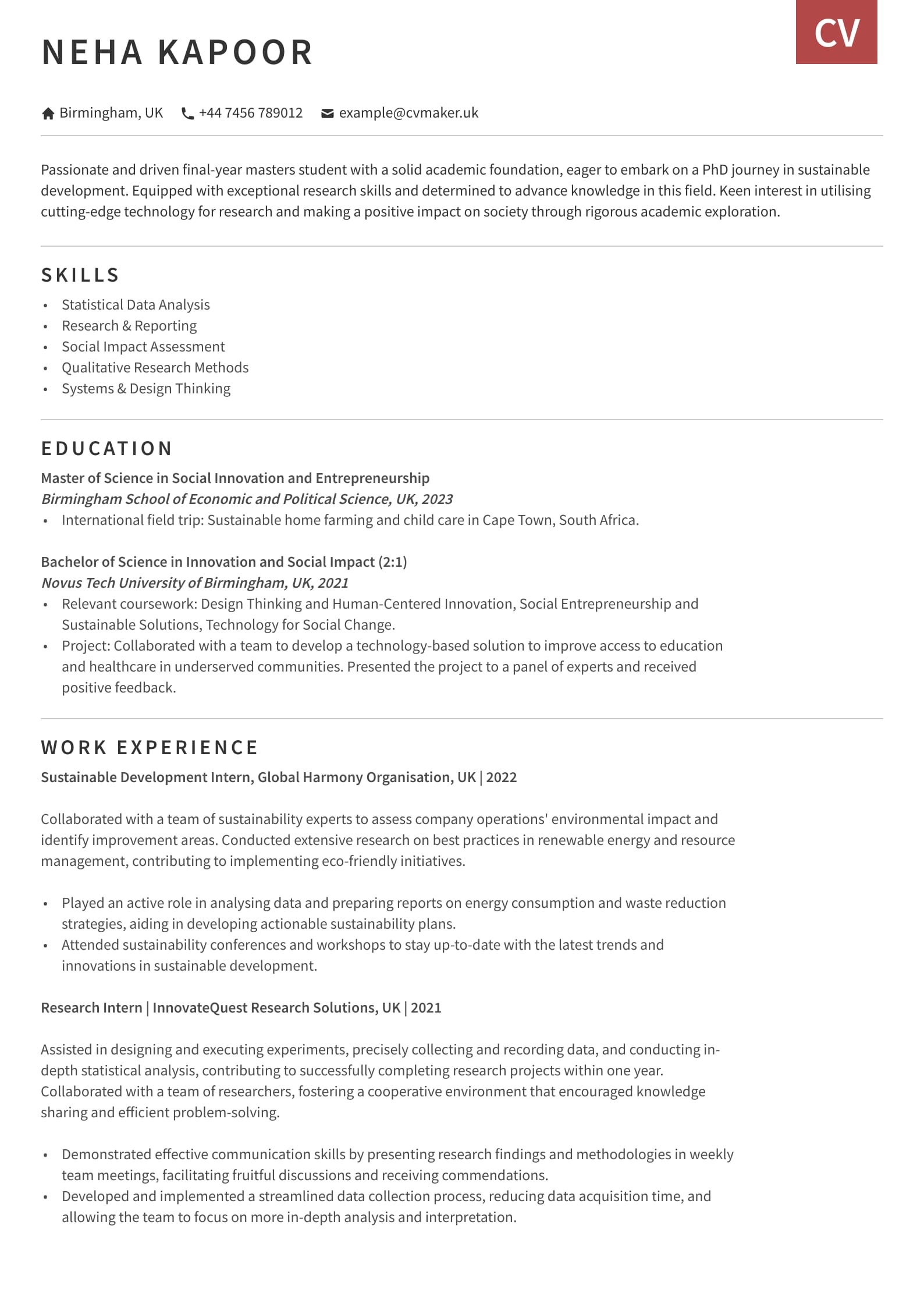
Table of contents
How to Write a CV for a PhD Application (Examples, Tips, and Writing Guide)
Embarking on the path to advanced research and academic excellence through a PhD is an exciting journey, demanding not just passion and dedication but also a well-crafted CV that highlights your potential as an aspiring scholar. In the highly competitive landscape of higher education, your CV is vital in determining whether you will stand out as an exceptional candidate.
Whether you are a student , a graduate, or a seasoned professional seeking to elevate your academic pursuits, this article is for you. It details the essential elements of composing a CV that captures your academic journey, research experience, and future career aspirations. From understanding the unique expectations of a PhD application to incorporating relevant experiences and honing an impactful writing style, we delve into the steps to create a good CV .
The CV writing process: Where to start?
A CV tailored explicitly for a PhD application demands a strategic approach highlighting your education, academic accomplishments, and research experience that sets you apart. This document serves as your initial introduction to prospective educational institutions and faculty members, making it imperative to leave a lasting impression that sparks curiosity and interest. Here are two essential pointers to consider:
A fundamental starting point is the creation of a comprehensive master CV, serving as the foundation to build upon as your academic journey progresses. Update it regularly, capturing personal details, educational achievements, work experience, skills, and notable accomplishments.
After that, tailor each iteration by emphasising relevant experiences and qualifications, moulding the personal profile to reflect your academic trajectory and strategically showcasing pertinent skills that set you apart in the fiercely competitive job market.
Tips on how to write a PhD CV
Gain insight into the industry and the specific requirements of your desired PhD programme.
Organise your CV thoughtfully into sections, such as personal details, personal profile, work experience, education, and skills.
Showcase concrete achievements or projects that align with your career goals. Emphasise quantifiable results to demonstrate the impact of your scholarly endeavours.
Integrate relevant keywords to optimise your CV for applicant tracking systems (ATS). This can increase your chances of passing the initial screening process.
Customise each CV to suit the specific application, showcasing how your unique set of skills and experiences perfectly align with the requirements of the programme.
Error-free and engaging writing is paramount. Thoroughly proofread your CV to ensure clarity, coherence, and an overall captivating presentation that will captivate the attention of hiring managers.
Looking to create a CV for a PhD application?
Phd cv example.

Download this PhD CV sample in PDF.
Neah Kapoor, an aspiring and dedicated PhD candidate, has opted for the Otago template to craft her impressive CV. Her passion lies in forging a career in policy analysis, with a special focus on sustainable development and environmental planning. Neah's exceptional academic background and remarkable achievements have been meticulously showcased, underscoring her potential as a valuable contributor to shaping a more sustainable world.
What to include in a PhD CV?
A CV must be comprehensive and well-organised, showcasing your academic qualifications, research experience, and potential as a promising academic researcher or PhD student. See our tips on what to include below (if applicable):
List your degrees chronologically, starting with the most recent. Include the name of the institution, degree obtained, major/specialisation, and graduation date.
Detail your research experience, including internships, projects, or positions held in academic or research settings.
If you have teaching or short-term experience, include the details of the courses you taught, the institution, and the duration of your involvement.
List any academic papers, articles, book chapters, or other scholarly publications you have authored or co-authored. Include the full citation for each publication.
Mention any academic conferences where you presented your findings. Provide details such as the conference name, date, and location.
List the specific research methodologies, techniques, and tools you are proficient in.
Highlight academic achievements, such as winning competitions, scholarships, grants, or fellowships.
If relevant, include extracurricular activities such as hobbies and interests , demonstrating leadership, teamwork, or community engagement.
This is usually on request, but if required, provide the names and contact information of academic or professional references who can vouch for you.
What is a professional summary for a PhD CV?
A professional summary, also known as a personal profile , is a concise and impactful statement that provides a snapshot of your academic background, research expertise, and career aspirations. It serves as an introduction to your CV, capturing the attention of potential employers or educational institutions and enticing them to delve further into your qualifications. Tips on writing a professional summary:
Keep it brief, ideally limited to 4-6 lines.
Mention that you are a PhD candidate or specify the degree you are currently pursuing.
Showcase your enthusiasm for your research area and the academic field in general.
PhD student CV personal profile example
Passionate and driven student in marine biology, dedicated to unravelling the mysteries within this captivating field. Solid foundation in marine biology and an insatiable curiosity for groundbreaking research and innovative discoveries. Aspire to leave a lasting impact on the academic landscape, driving advancements that positively influence society and transform our understanding of marine ecosystems.
Academic CV for PhD application personal profile example
Passionate PhD candidate in forestry with an insatiable curiosity for knowledge and intellectual exploration. Equipped with a strong academic background and dedication to cutting-edge research, committed to making meaningful contributions to forestry. Eager to collaborate with esteemed mentors, embracing interdisciplinary challenges to empower future generations of forestry thinkers.
Refer to our academic CV example for more tips.
What skills should be included in a CV for PhD?
Highlighting skills that demonstrate your potential as a successful researcher and scholar is essential. See our examples below:
Hard skills:
Research Methodologies
Data Analysis
Academic Writing
Literature Review
Computer Programming.
Soft skills:
Critical Thinking
Communication
Time Management
Adaptability
Problem-Solving.
Transferable skills:
Organisational Skills
Teaching and Mentoring
Public Speaking
Project Management
Analytical Skills.
To leave a lasting impact on recruiters, it's essential to distinguish between various types of skills on a CV.
How to write work experience on a CV for PhD application
When writing work experience on a CV, it's essential to present your research-related experiences and accomplishments clearly and concisely. See our tips below:
Start with a clear CV section heading, such as "Work Experience" or "Research Experience."
Include the company/institution name and location.
Specify your job title or position, such as "Research Intern," "Research Assistant," "Laboratory Technician," etc.
Include the period you worked in that position, using years.
Provide a brief overview of your tasks and responsibilities during your work experience. Focus on research-related activities, laboratory work, data analysis, academic projects, or other relevant tasks.
Highlight specific accomplishments or achievements during your work experience.
If applicable, mention any publications, presentations, or academic papers from your work experience. Include the names of supervisors or researchers you worked with and any notable collaborations.
Research Intern, OceanLife Research Institute, Queensland, AU | 2022
Collaborated with a team of marine biologists in conducting field surveys to assess the biodiversity and health of coral reefs. Assisted in collecting and analysing water samples to study the impact of environmental factors on coral bleaching. Maintained and calibrated oceanographic instruments, ensuring accurate and reliable data collection during research expeditions. Attended workshops and seminars by renowned marine scientists, enhancing knowledge of current advancements in marine biology and ecological research
Conducted a comprehensive literature review on marine conservation practices, contributing to the development of a research proposal for a sustainable fishing initiative.
Contributed to drafting a research paper that investigated the symbiotic relationship between marine microorganisms and coral reefs, which was subsequently submitted for publication in a peer-reviewed scientific journal.
If you have no work experience , refer to our skills-based CV example.
Education CV section for a PhD student or applicant
The education section of a CV for a student or applicant showcases your academic qualifications and sets the foundation for your scholarly pursuits. When including your degree in this section, make sure to provide the following details:
Clearly state your degree, including the exact title or specialisation.
Specify the field of study or research area in which you pursued.
Mention the name of the university or institution where you earned your degree.
Include the year of your graduation or expected date of graduation.
Doctor of Philosophy in Educational Psychology Manchester University of Manchester, UK | 2022
If you have additional forms of qualifications, consider adding courses and certificates in a new section.
Key takeaways
Now that you have more insight into what makes a good CV, we encourage you to follow your passion for knowledge and academic excellence when embarking on a PhD journey. Consider these essential tips to enhance your CV for a successful application:
Showcase academic achievements and honours.
Emphasise research skills and methodologies.
Clearly state research interests and goals.
Tailor the CV for each application to align with specific program requirements.
Next steps?
By adhering to a writing process, conducting research, and leveraging relevant skills, you can increase your chances of securing a placement. If you are not a strong writer, consider our CV Writing Services or browse our CV examples , CV templates , or cover letter templates for further insight.
How do you write a PhD academic CV?
As an academic, highlight your research experiences, academic achievements, skills, and relevant publications by tailoring it to the specific programme requirements.
What should a CV for a PhD look like?
A good CV should follow a clear structure and clean format. The chosen template should only include relevant sections such as personal details, education, experience, skills, awards, or publications.
What is the CV of a PhD student?
As a student, you have little experience so consider utilising a skills-based format while focusing on academic background, research experiences, publications, conference presentations, and any relevant achievements or projects.
How long should a PhD CV be?
A CV for a graduate, student, or someone with little experience typically is one page. However, with academic CVs, they tend to be between two and three pages while still focusing on relevant information and avoiding unnecessary details.
Do you need a CV for PhD?
A CV is typically required when applying for a PhD programme, as it highlights your academic achievements and research experiences. Depending on the programme and, possibly, country, make sure to check the requirements and tailor your application accordingly.
Land the interview for your dream job with CVMaker
Effortlessly create your professional CV within 10 minutes and download it whenever and wherever you want!
Increase your chances of landing your dream job with CVMaker.

- Appointments

- Resume Reviews

- Undergraduates
- PhDs & Postdocs
- Faculty & Staff
- Prospective Students
- Online Students
- Career Champions
- I’m Exploring
- Architecture & Design
- Education & Academia
- Engineering
- Fashion, Retail & Consumer Products
- Fellowships & Gap Year
- Fine Arts, Performing Arts, & Music
- Government, Law & Public Policy
- Healthcare & Public Health
- International Relations & NGOs
- Life & Physical Sciences
- Marketing, Advertising & Public Relations
- Media, Journalism & Entertainment
- Non-Profits
- Pre-Health, Pre-Law and Pre-Grad
- Real Estate, Accounting, & Insurance
- Social Work & Human Services
- Sports & Hospitality
- Startups, Entrepreneurship & Freelancing
- Sustainability, Energy & Conservation
- Technology, Data & Analytics
- DACA and Undocumented Students
- First Generation and Low Income Students
- International Students
- LGBTQ+ Students
- Transfer Students
- Students of Color
- Students with Disabilities
- Explore Careers & Industries
- Make Connections & Network
- Search for a Job or Internship
- Write a Resume/CV
- Write a Cover Letter
- Engage with Employers
- Research Salaries & Negotiate Offers
- Find Funding
- Develop Professional and Leadership Skills
- Apply to Graduate School
- Apply to Health Professions School
- Apply to Law School
- Self-Assessment
- Experiences
- Post-Graduate
- Jobs & Internships
- Career Fairs
- For Employers
- Meet the Team
- Peer Career Advisors
- Social Media
- Career Services Policies
- Walk-Ins & Pop-Ins
- Strategic Plan 2022-2025
Phd/postdoc resume samples
Graduate CV examples
If you’re looking to bag yourself a top graduate job, you’re going to need a strong graduate CV.
Competition for the best jobs can be tough, so you need a CV that holds employers attention and shows them why you are the best candidate for the job.
This post contains 9 real-life graduate CV examples that have been used to land interviews and secure job offers for graduates.
And there is also a step-by-step guide on how to write your own winning graduate CV.
CV templates
Graduate CV Example – Accounting
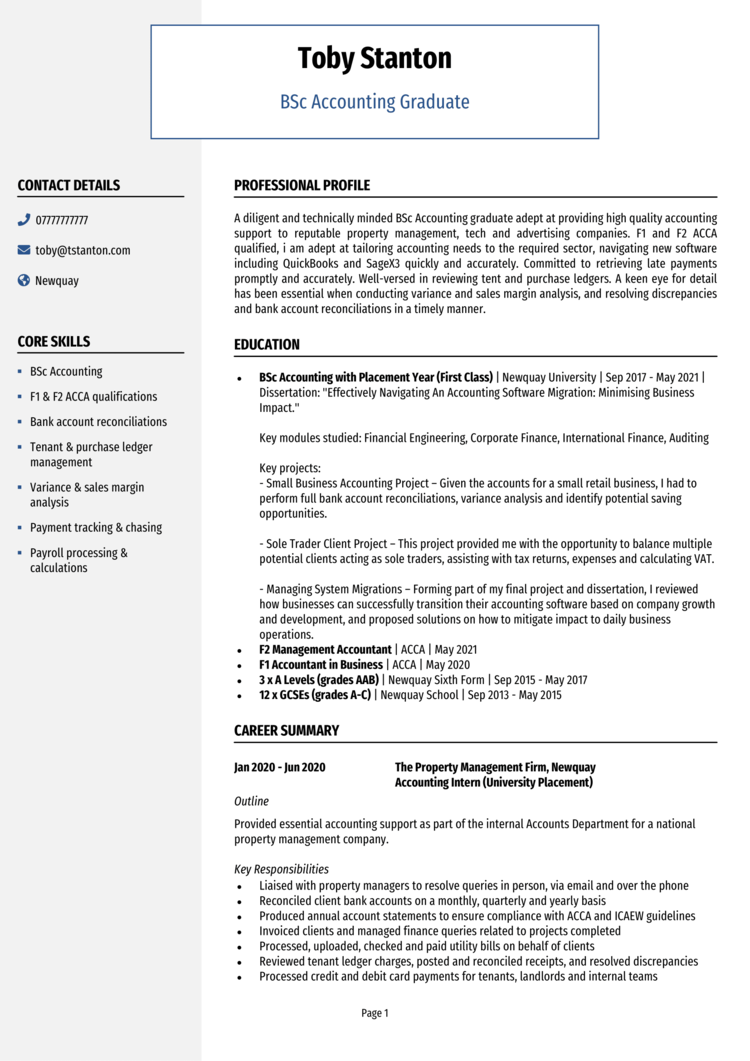
Engineering graduate CV
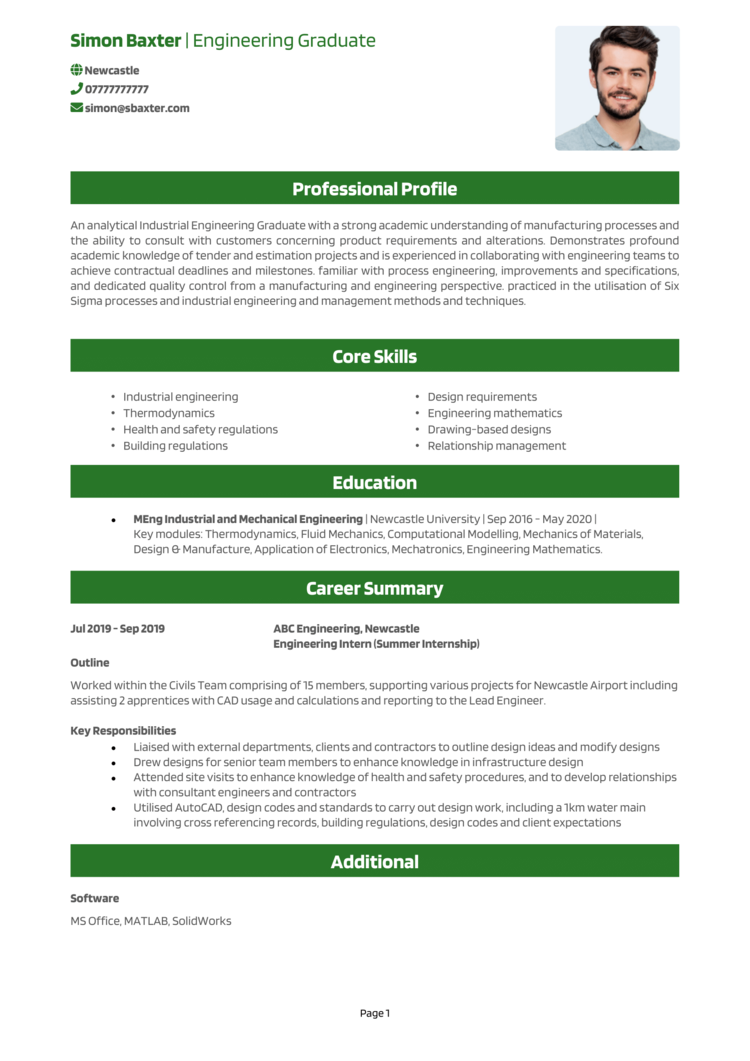
Top tips for writing a graduate CV
- Research your target jobs thoroughly before you write your CV and identify the most important skills and knowledge required – then highlight them across your CV
- Write a persuasive personal statement at the top of your CV that gives an overview of your talents and explains the benefits an employer will get from hiring you
- Avoid CV clichés like “ I am hard-working team player ” and instead focus on skills and knowledge that are specific to your industry or degree subject
- If you have completed work placements whist at university, make them prominent in your CV to show recruiters how you can apply your skills in the workplace
Finance graduate CV
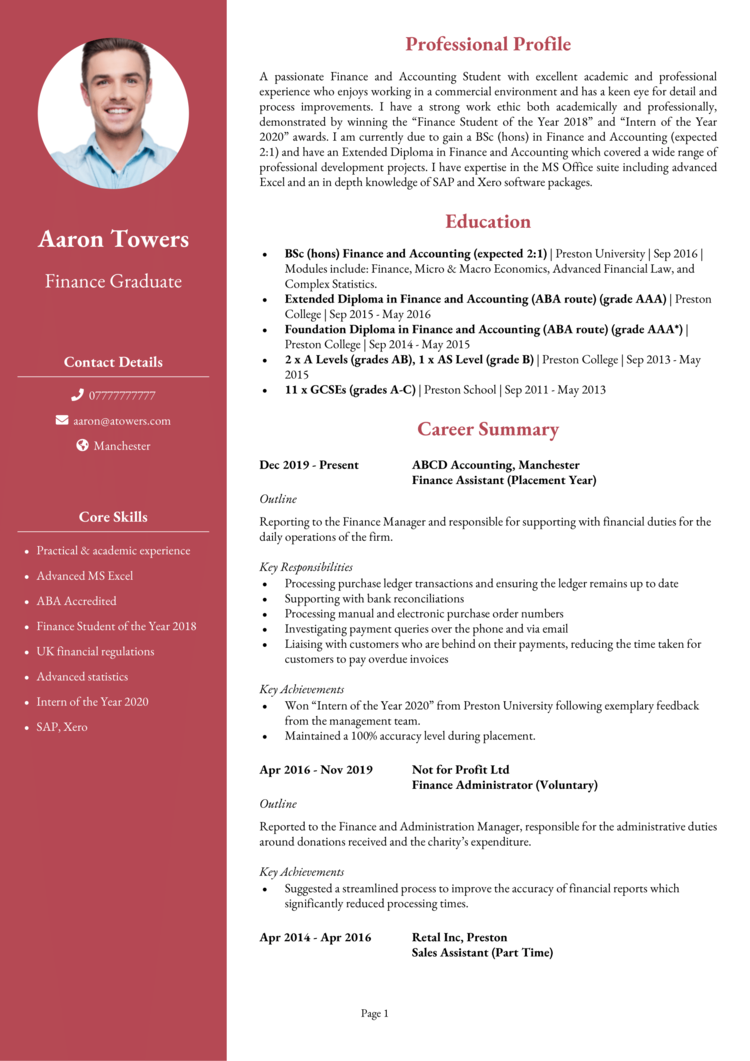
Law student CV
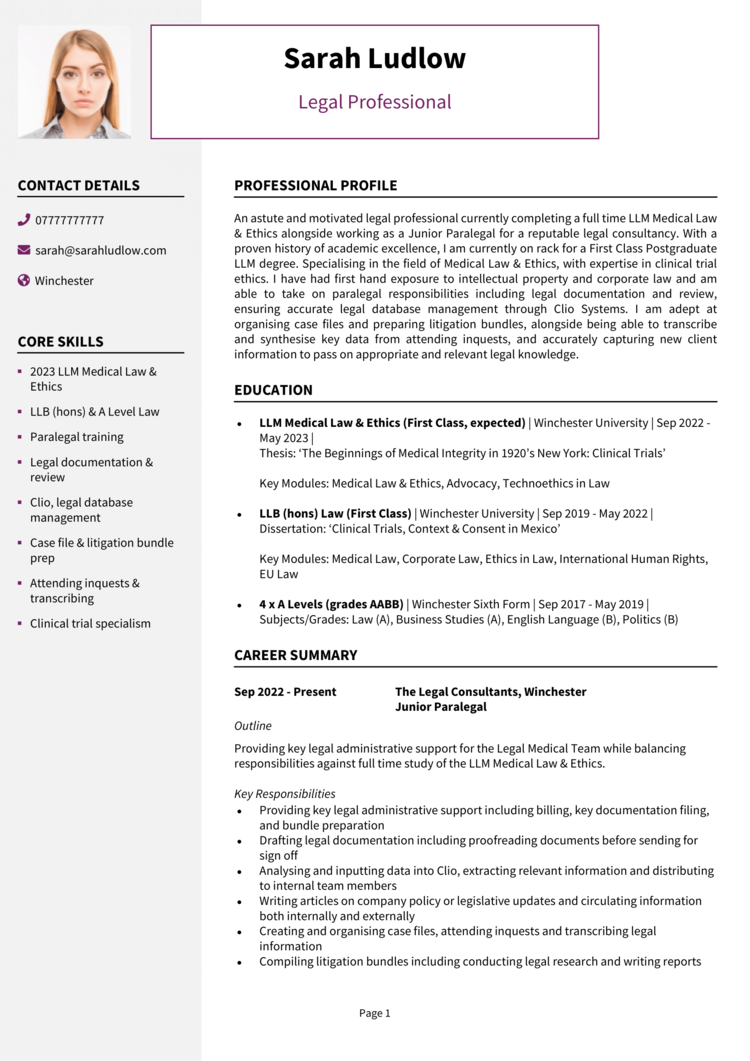
Marketing graduate CV
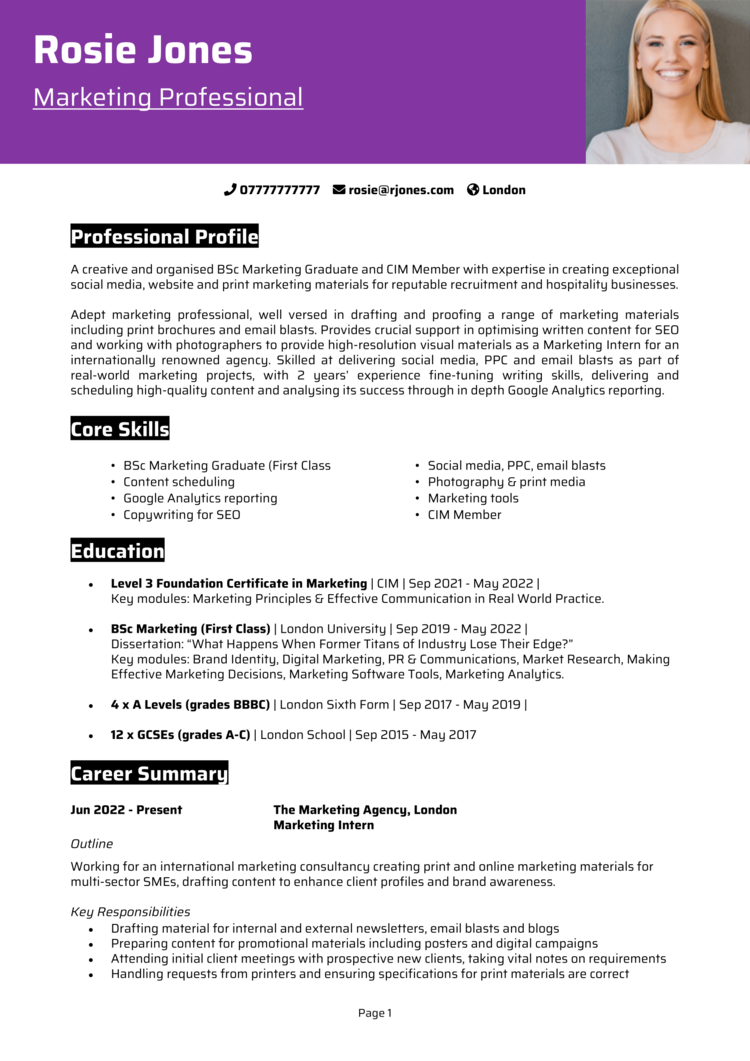
Graduate CV mistakes to avoid
- Don’t overcomplicate the design and layout of your CV. Crowded layouts, big photos and crazy colour schemes will make it difficult for busy hiring managers to navigate your CV
- Don’t leave work experience out. Even part-time shop jobs or voluntary roles give you a chance to display your workplace skills, so don’t discount them
- Don’t use a silly email address on your CV – it will not look professional. If you have an old email address with a nickname – create a new one for your job hunting
- Don’t forget to triple check for spelling and grammar mistakes – spellcheck does not always catch everything.
Masters student CV
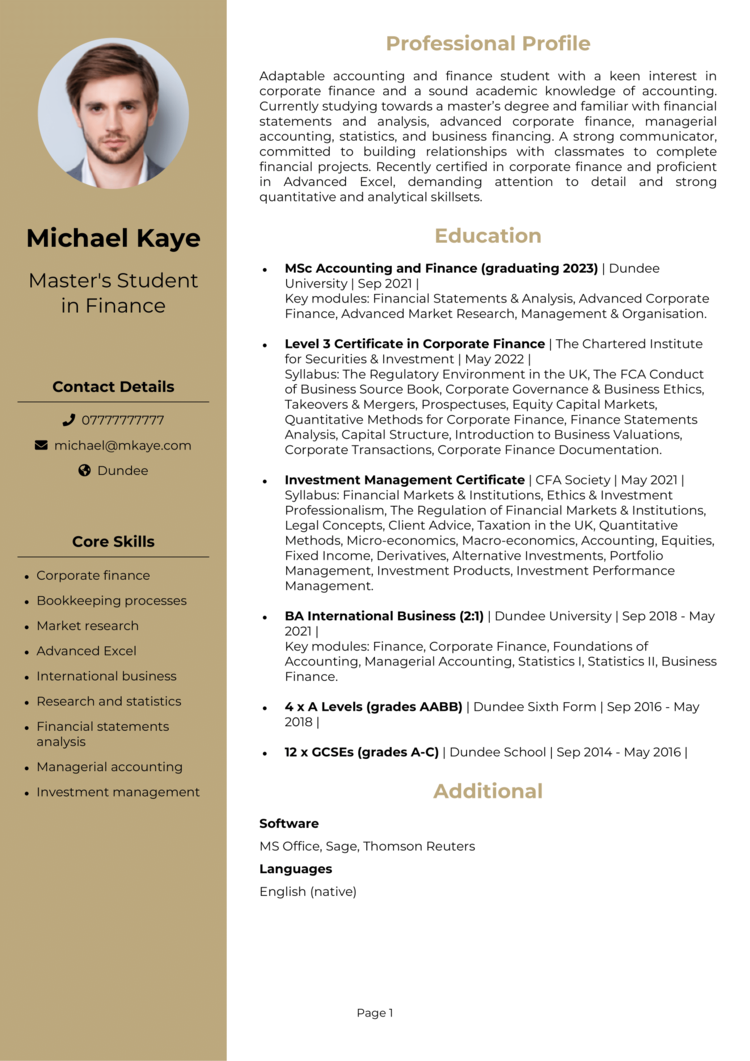
PhD graduate CV
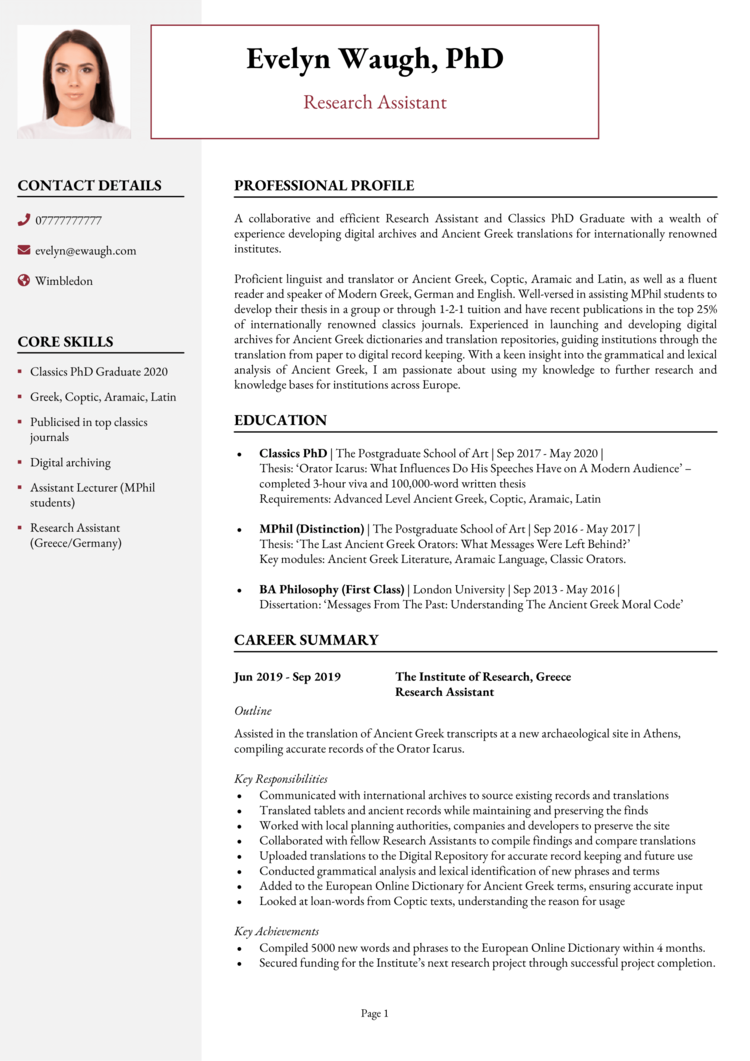
Postgraduate CV
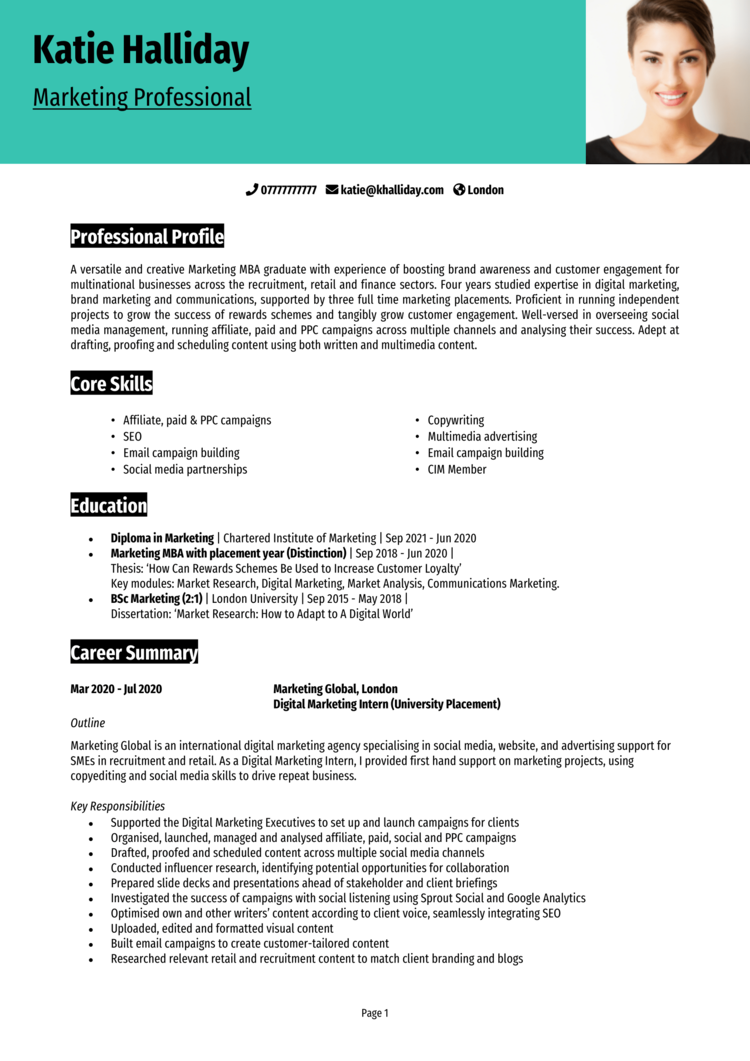
Psychology graduate CV
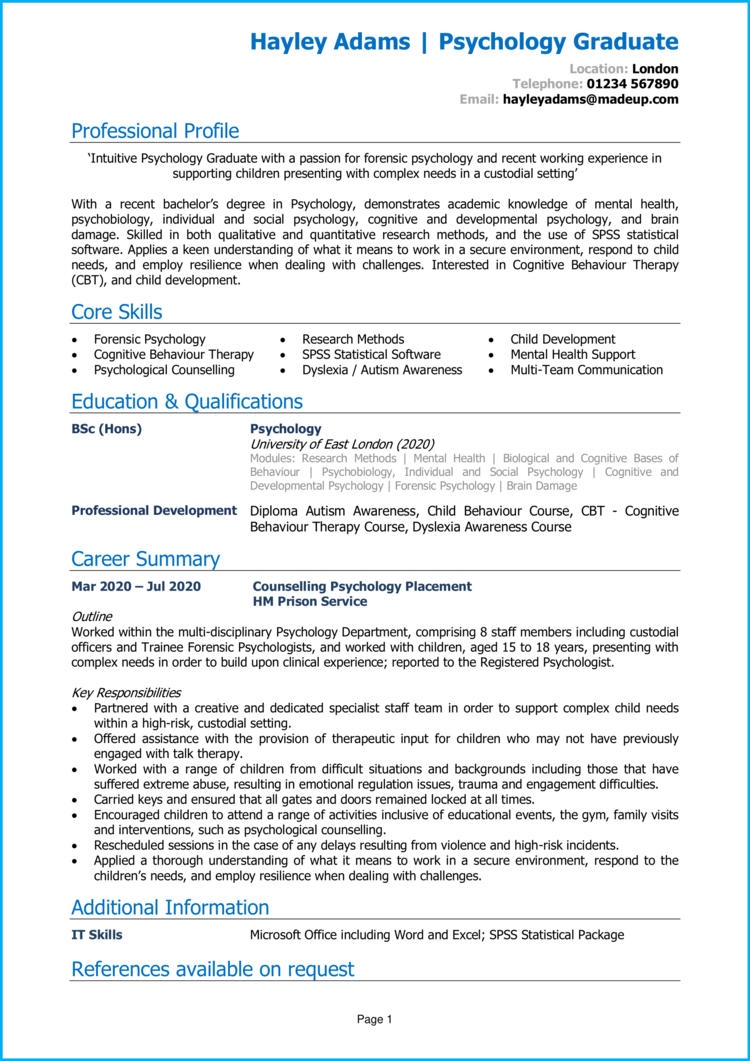
How to write a graduate CV
The graduate CV examples above give you a good idea of how your CV should look, and how the information should be laid out .
Now, I will walk you through the writing of your own unique CV, detailing what to include in each section and how to adapt the content to the sector you’re applying for.
What is a CV?
Who reads your cv, graduate cv structure & format.
- CV profile / personal statement
- Work experience
- Hobbies & interests
A CV (which stands for curriculum vitae ) is a written document which summarises your education, experience, skills and knowledge.
It acts as your introduction to a potential employer, and aims to show them why you are the perfect candidate for their vacancy.
A good CV will get you plenty of responses and interviews , and take you one step closer to landing a graduate job with a good salary .
When you apply for a job via email or a job website, a recruiter or hiring manager will receive it and review it.

A recruiter could work for an external recruitment agency, or directly for the employer and they’re responsible for finding the right applicants for that organisation’s roles, acting as a middle-man between you and the hiring manager.
A hiring manager is a team leader or manager who is looking to fill a role within their team, they will most likely be your supervisor if you’re successful in securing the position.
Quick tip: Hiring managers and recruiters are normally very busy people, and they see lots of CVs on a daily basis. Bear this in mind when writing your CV and always try to make it concise and easy to read.
You can also check out my video guide to writing a CV when you have no experience.
Your CV structure and format are crucial to ensuring that a recruiter can read your CV with ease and quickly navigate to the parts that interest them most.
The infographic below gives an overview of how to layout your graduate CV and what sections should be included.
CV formatting tips
- A graduate CV or undergraduate CV should ideally be no longer than 2 sides of A4 to cater for modern attention spans and keep readers interested – of you have little or no work experience, this could be squeezed down to 1 page.
- Stick to a basic clean font and colour scheme – simple styling makes the document a pleasant read and keeps it looking professional
- Break up text using bullet points and headers to aid the flow of information and make it less tedious to read.
- Pictures and logos deflect from the substance and waste valuable space on your CV – so avoid using them.
Structuring your Graduate CV
When writing your CV, divide it up into the following sections:
- Contact details – Should be at the top of the page to ensure they aren’t missed.
- Profile/personal statement – This is an intro/overview of your talents, forming a good first impression and allowing the recruiter to gain a quick insight into your suitability for roles. Tailor this profile to match the skills and knowledge your target employers are looking for.
- Education – List your qualifications in detail here, with a focus on your degree, as that is what most graduate recruiters will be interested in
- Relevant Projects – As your work experience may be limited, look to document projects you have been part of that relate to your target roles, or perhaps some core skills you learnt at University.
- Work experience / career history – Add any previous work experience in reverse chronological order – it’s best to start with Uni work placements as they will be most relevant
- Interest and hobbies – An optional section to highlight hobbies that can demonstrate your skills that can transition into the working world.
CV Contact Details
When you trying to get responses from recruiters, it’s essential that they can easily find your contact information, so make sure it stays at the top of the 1st page.

Only relevant and basic details are required so keep to the below:
- Phone Number – This will ideally be your mobile number so that you can respond to calls quickly.
- Email address – Use a professional email address, preferably one that consists of your first name and last name – no nicknames!
- Location – If you’re currently between your university residence and your home location, add the city in which you’re searching for work.
- If you have a LinkedIn account then you could also add a link to your profile, although this is not essential.
Quick tip: You can save space and add some design flair to your CV by adding some icons to symbolise the contact details in your header.
Graduate CV Profile/ Personal Statement
Your personal statement or profile , is an introductory paragraph which sits at the top of your CV, and it’s aim is to draw recruiters in by showcasing your most relevant qualifications, skills and experience.

Quick tip: Do some research to find out what skills your desired employers are looking for by browsing through relevant job adverts.
Below is an example of a strong graduate CV profile.
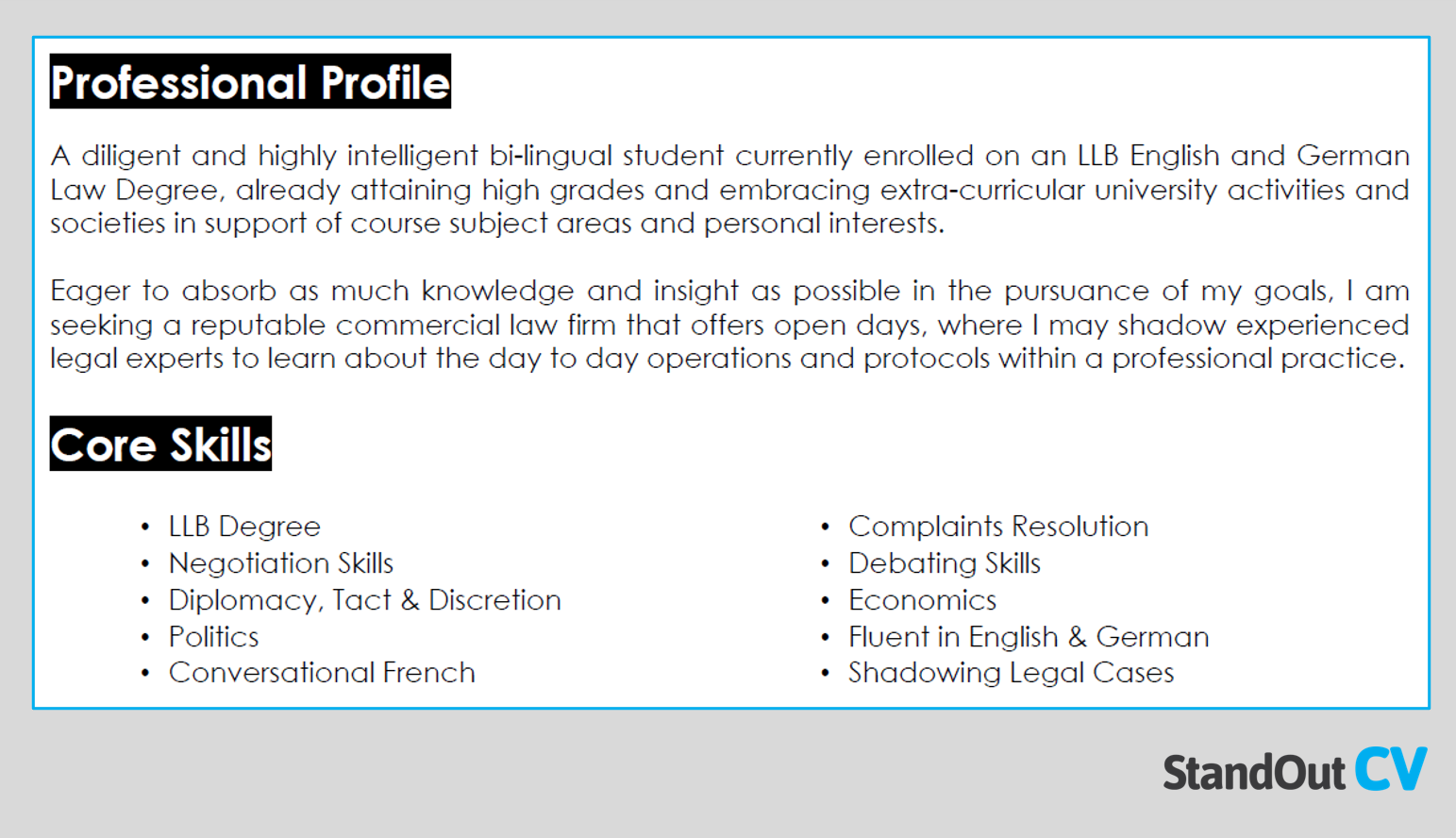
This is the type of content you should be including in your CV personal statement:
Educational history – The degree field you studied and what specialist knowledge or practical abilities you took away from your education.
Workplace skills – Include hard skills like languages, IT system knowledge, writing skills, sales, marketing etc. Avoid using too many soft skills ( team work , communication, organisation etc . ) as these are needed for most jobs and won’t make you stand out.
Work experience – If you’ve secured any internship placements or had any prior work experience you should mention it, especially if the work relates to your target roles.
Interest in your desired field – As a junior candidate, there may not be much to differentiate you from other graduates , so describing your passion for the career you are pursuing can show employers you will be a serious committed hire. (You should also include this in your cover letter )
Quick tip: Start your profile with a punchy headline to reel employers in and get more attention to your CV.
Core skills and achievements section
A bullet pointed list of impressive skills and achievements is a great way to catch recruiters’ eyes and give them a snapshot of your talents within seconds of them opening the CV.
You can include relevant workplace skills, or any academic achievements or positions of responsibility such as being a prefect or leading a student club.
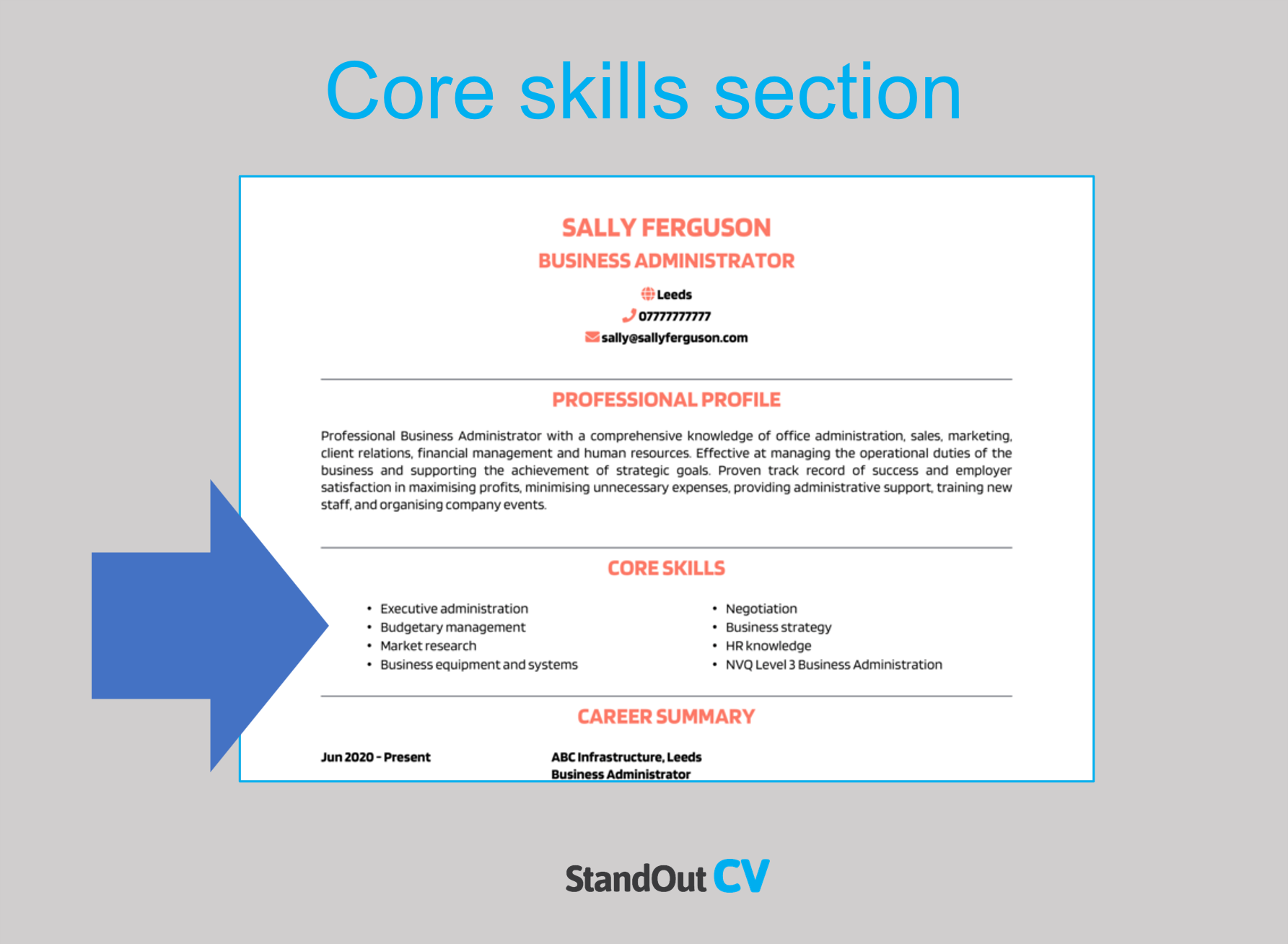
Relevant Projects
This is an optional extra section to evidence any projects you were involved in during your degree, whilst at work, or even as part of your extra curricular activities – think of projects that would be beneficial to the industry you’re applying to for best results.
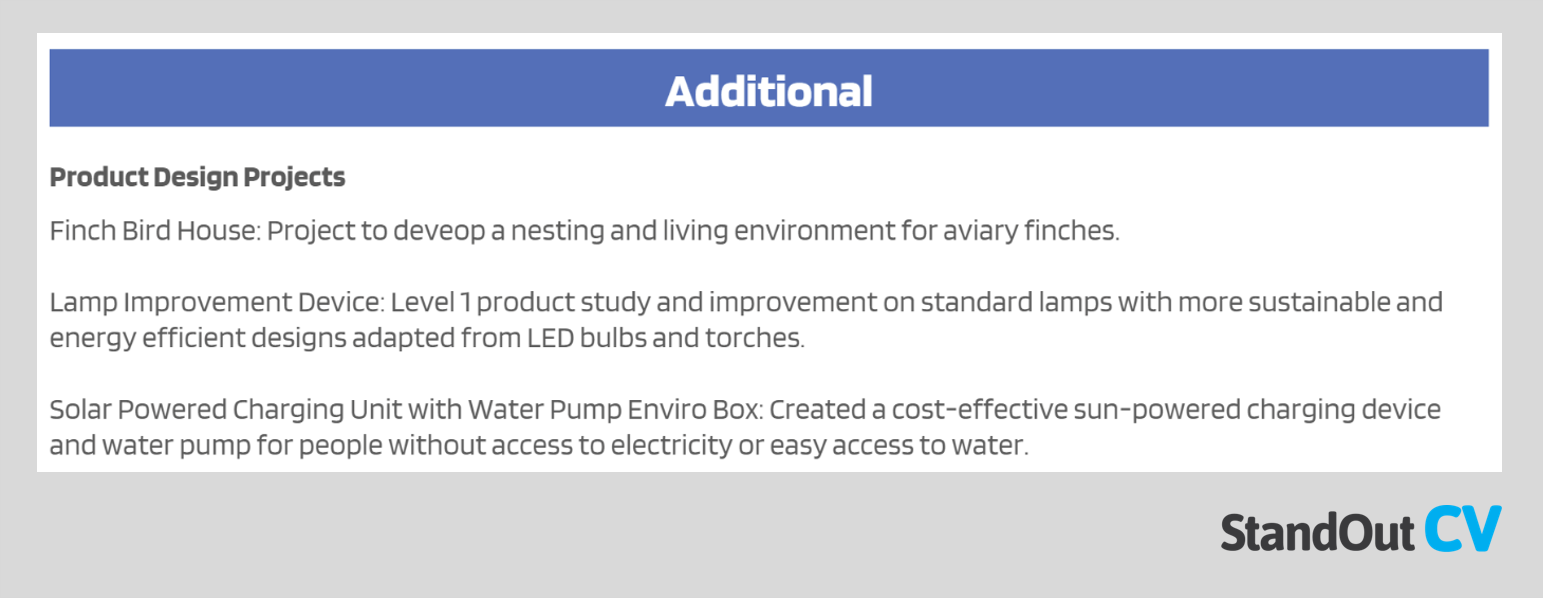
Be specific, documenting your exact responsibilities and consider any relevant facts or figures that will add more credibility to your examples, such as timelines of the projects and outputs.
Break up projects using bullet points and giving a bold header to each one, allowing ease of reading.
See also: CV for PhD application
Your educational experience will be detailed throughout your CV, but this section is reserved for recording all qualifications you have achieved for completeness.
It’s important to include all of your qualifications from GCSEs upwards as some companies have strict educational entrance policies for grad roles (e.g. must have 5 GCSEs A-C )
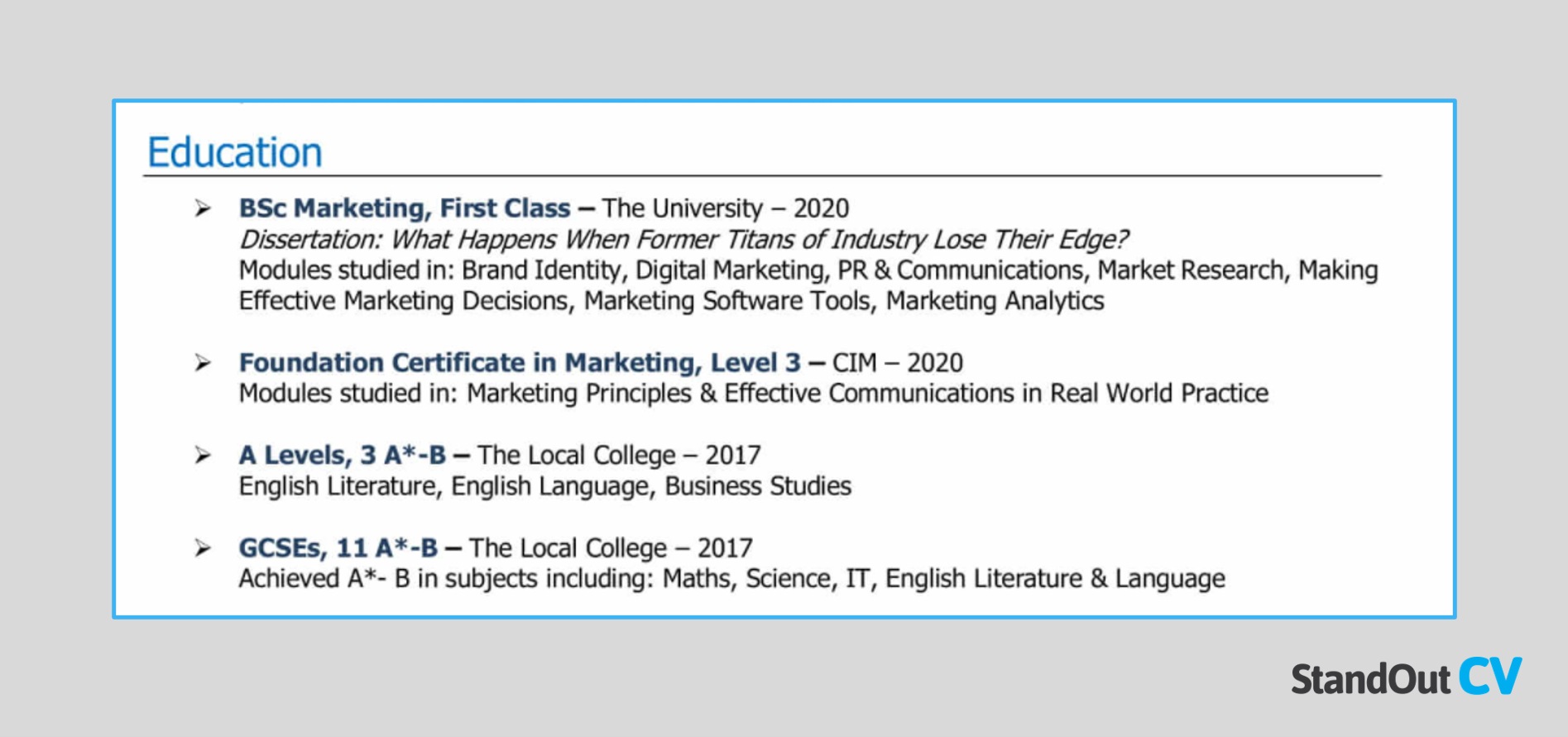
Basic CV template
Add depth to your education , including the level of each qualification completed, dates of achievement and institute in which you studied, as well as any important modules covered.
Begin with your most recent qualification (probably your degree) and work in a backwards chronological order.
You will need to include lots of detail on your degree because that is the area recruiters are likely to be most interested in.
Work Experience
You may not have any direct paid work experience, or you may have some part-time retail or restaurant waiting experience.
You may have undertaken a work placement with school or university.
Or, you may have voluntary work experience.
Whatever experience you have, it’s important to use it to show how you apply your skills in the workplace.

Generally speaking you should list your work experience in reverse chronological order – however, if you have work placements that relate to the roles you are applying for, you need to prioritise them and place them at the top of your work experience to ensure they get seen.
If you are struggling with a lack of work experience , check out the infographic below which shows some actionable points for improving your CV when you have little or no experience .

Structuring your Roles
Break up the information in your roles by using clearly divided sections and bullet points – below is the structure you should be working towards.

For each role, briefly describing the goal of the role and the organisation you were employed within.
“Assisting a team of senior designers to produce a range of clothing items for luxury womens brand”
Key Responsibilities
List your activities in short sharp bullet points and try to show your impact on the business.
- Handling customer complaints to resolve issues and protect the reputation of the business
- Attending briefing meetings and taking notes to provide a record of outputs
Key Achievements
To really prove your value, try to include some impressive achievements you have made that have had a positive effect on your employer.
Try to back your claims up with facts and figures where possible
- Formatted 10 presentation slides which supported sales team in closing 5 sales in 1 month
- Resolved 98% of complaints within recommended 10 day time frame
Quick tip: A poorly written CV will fail to impress recruiters and employers. Use our quick-and-easy CV Builder to create a winning CV in minutes with professional templates and pre-written content for every industry.
Hobbies and Interests
The hobbies segment of your CV is optional, but if you have limited work experience this is an opportunity to showcase any relevant talents you have gained through extra-curricular activities.
Some good hobbies to include as a graduate are:
Sports clubs – If you play in (or lead) a sports club, this can be a great way to demonstrate your teamwork, leadership, communication and organisation abilities.
Personal projects – E.g. If you are applying for writing jobs and you run your own personal blog, there will be lots of relevant skills you can draw from your experience there.
Impressive feats – If you’ve run a marathon or climbed a mountain, this can prove that you are a driven individual and make you stand out from the crowd.
Writing your Graduate CV – Conclusion
Writing a graduate CV can be tough, especially when you have little or no work experience.
But, if you follow the guidelines above and draw on your education and extra-curricular activities to showcase plenty of skills, you should be able to create a winning CV.
Keep the format simple and focus on creating a pleasant reading experience to ensure that your CV gets the attention it deserves.
Landing that first job will be a challenge, so be prepared to put plenty of work in and apply for as many jobs as you can whilst networking on LinkedIn and seeking out companies speculatively.
You can also check out our school leaver CV or some of our best CV templates here for more support
Good luck with the job search!
See also: Graduate cover letter – Psychology graduate CV – Marketing graduate – Finance graduate – Accounting graduate
Jump to navigation
Search form

The Graduate School
- Faculty/Staff Resources
- Programs of Study Browse the list of MSU Colleges, Departments, and Programs
- Graduate Degree List Graduate degrees offered by Michigan State University
- Research Integrity Guidelines that recognize the rights and responsibilities of researchers
- Online Programs Find all relevant pre-application information for all of MSU’s online and hybrid degree and certificate programs
- Graduate Specializations A subdivision of a major for specialized study which is indicated after the major on official transcripts
- Graduate Certificates Non-degree-granting programs to expand student knowledge and understanding about a key topic
- Interdisciplinary Graduate Study Curricular and co-curricular opportunities for advanced study that crosses disciplinary boundaries
- Theses and Dissertations Doctoral and Plan A document submission process
- Policies and Procedures important documents relating to graduate students, mentoring, research, and teaching
- Academic Programs Catalog Listing of academic programs, policies and related information
- Traveling Scholar Doctoral students pursue studies at other BTAA institutions
- Apply Now Graduate Departments review applicants based on their criteria and recommends admission to the Office of Admissions
- International Applicants Application information specific to international students
- PhD Public Data Ph.D. Program Admissions, Enrollments, Completions, Time to Degree, and Placement Data
- Costs of Graduate School Tools to estimate costs involved with graduate education
- Recruitment Awards Opportunities for departments to utilize recruitment funding
- Readmission When enrollment is interrupted for three or more consecutive terms
- Assistantships More than 3,000 assistantships are available to qualified graduate students
- Fellowships Financial support to pursue graduate studies
- Research Support Find funding for your research
- Travel Funding Find funding to travel and present your research
- External Funding Find funding outside of MSU sources
- Workshops/Events Find opportunities provided by The Graduate School and others
- Research Opportunities and programs for Research at MSU
- Career Development Programs to help you get the career you want
- Teaching Development Resources, workshops, and development opportunities to advance your preparation in teaching
- Cohort Fellowship Programs Spartans are stronger together!
- The Edward A. Bouchet Graduate Honor Society (BGHS) A national network society for students who have traditionally been underrepresented
- Summer Research Opportunities Program (SROP) A gateway to graduate education at Big Ten Academic Alliance universities
- Alliances for Graduate Education and the Professoriate (AGEP) A community that supports retention, and graduation of underrepresented doctoral students
- Recruitment and Outreach Ongoing outreach activities by The Graduate School
- Diversity, Equity, and Inclusion Funding Funding resources to recruit diverse students
- Graduate Student Organizations MSU has over 900 registered student organizations
- Grad School Office of Well-Being Collaborates with graduate students in their pursuit of their advanced degree and a well-balanced life
- Housing and Living in MI MSU has an on and off-campus housing site to help find the perfect place to stay
- Mental Health Support MSU has several offices and systems to provide students with the mental health support that they need
- Spouse and Family Resources MSU recognizes that students with families have responsibilities that present challenges unique to this population
- Health Insurance Health insurance info for graduate student assistants and students in general at MSU
- Safety and Security MSU is committed to cultivating a safe and inclusive campus community characterized by a culture of safety and respect
- Why Mentoring Matters To Promote Inclusive Excellence in Graduate Education at MSU
- Guidelines Guidelines and tools intended to foster faculty-graduate student relationships
- Toolkit A set of resources for support units, faculty and graduate students
- Workshops Workshops covering important topics related to mentor professional development
- About the Graduate School We support graduate students in every program at MSU
- Strategic Plan Our Vision, Values, Mission, and Goals
- Social Media Connect with the Graduate School!
- History Advancing Graduate Education at MSU for over 25 years
- Staff Directory
- Driving Directions
IMA EXAMPLE (Chemistry) 21 College Street, City, State, Zip 123-456-7890 | [email protected]
EDUCATION AND TRAINING Michigan State University, Department of Chemistry PhD Candidate in Chemistry, September 20XX - present
Michigan State University, Department of Chemistry Bachelors of Science, (Honors) Biochemistry and Molecular Biology, May 20XX
CERTIFICATES AWARDED Graduate Certificate in College Teaching, MSU, 20XX International Communication Skills Certificate, MSU 20XX Intel Certificate of Project-based Technology, Ann Arbor, 20XX
RESEARCH ACTIVITES Enzyme Kinetics Kinetic Isotope Effects Protein Expression and Purification Organic and Enzymatic Synthesis (mirco scale)
RESEARCH APPLICATIONS HPLC; FPLC; Cell Culture; LSC (Liquid Scintillation Counting); UV-Vis spectrometer; NMR; IR; Mass spectrometry; Multivariate analysis (PCA, PLS, and NAS); MATLAB; Mini'Tab; Sigma Plot; RefWorks; Mathematica
FELLOWSHIPS Graduate School Summer Fellowship (MSU), June - July 20XX
GRADUATE TEACHING APPOINTMENTS Graduate Research Assistant, Department of Chemistry, MSU, Fall 20XX - Present Graduate Teaching Assistant, Department of Chemistry, MSU, January 20XX - May 20XX
HONORS AND AWARDS Distinction in Sciences Scholarship, (MSU), 2 years Outstanding Teaching Award (Dept. of Chemistry, MSU), 1 year Travel Award, Graduate Student Senate, (MSU), 1 year Future Scientist Scholarship, American Scientists Society, 4 years
SCHOLARSHIP Publications Sample, I., Mousee, N. N., Example, I. The Inhibition of Oxidase Activity of Flavin-Dependent Thymidylate Synthase . [Journal of Physical Chemistry], 59(14), 687-871, 20XX.
Recent Presentations Ima Example and Mouse, N. N. Kinetic Isotope Effects on H-Transfers Catalyzed by Thymidlyate Synthase , 20XX Gordon Research Conference: Isotopic Probes for Mechanisms In the Chemical and LIfe Sciences, Galveston, TX, February 20XX.
Posters Kinetic Isotope Effects on H-transfers Catalyzed by Thymidylate Synthas e. Poster Session, 69th National Conference, Boston, MA (March 20XX)
Contributed Talks Ima Example, Exploring the Role of Dynamics in Enzymatic Catalysis: Kinetic Isotope Effect Studies of E. coli Thymidylate Synthase , 44th ACS Midwest Regional Meeting, Chicago, IL (October 20XX)
SERVICE At-Large-Member, Council of Graduate Schools, 20XX - Present Volunteer, Red Cross Disaster Team, East Lansing area, 20XX - Present Tutor, America Reads, Lansing School District, 20XX - 20XX
AFFILIATIONS American Chemical Society Center for Biocatalysis and Bioprocessing
For more examples of CVs visit our friends at UC Davis .

- Call us: (517) 353-3220
- Contact Information
- Privacy Statement
- Site Accessibility
- Call MSU: (517) 355-1855
- Visit: msu.edu
- MSU is an affirmative-action, equal-opportunity employer.
- Notice of Nondiscrimination
- Spartans Will.
- © Michigan State University

IMAGES
VIDEO
COMMENTS
CV templates As you can see from the CV example above, a PhD CV is structured differently to a traditional CV. Instead of focusing on work experience, academic experience and accomplishments are prioritised. However, the fundamental CV writing rules stay the same. Therefore, the candidate has put forward their information in a way which is clear, concise and formatted for easy reading.
As you can see from the resume example above, a PhD resume is structured differently to a traditional resume. Instead of focusing on work experience, academic experience and accomplishments are prioritised. However, the fundamental resume writing rules stay the same. Therefore, the candidate has put forward their information in a way which is clear, concise and formatted for easy reading.
Applications Advice. Writing a CV for your PhD application is an important part of the process. A CV for a PhD application needs to be an academic CV. These differ from traditional CVs in several key ways. They provide a great opportunity for you to display your education background and any relevant research experience in a short and concise way.
2 PhD resume summary examples. Summary. Ph.D. Graduate in Mechatronics with high grades in Human-Robot Interaction, Robotics, Digital Control Systems, Mechatronics, Industrial Control. Wrote thesis on "Designing and implementation of PID controller robotic arm". Passionate about programming robots and working with people.
PhD Graduate CV example 2. CV templates. Before you start writing your own CV, take a look at the example PhD Graduate CV above to give yourself a basic understanding of the style and format that recruiters and hiring managers prefer to see. Also, take note of the type of content that is included to impress recruiters, and how the most relevant ...
Step 5: Proofread. There's one last important step to writing a CV for a PhD application. Make sure to double check and proofread your CV before submitting your PhD application. An academic CV for a PhD admission should be free of mistakes, so the school will see how dedicated and detail-oriented you are.
transferable skills (e.g., communication, research, and interpersonal skills) ability to think independently and critically. high standard of work. perseverance and dedication. 3. Downplay why people might not want to hire PhDs. For jobs outside of academia, a PhD degree can be a double-edged sword.
PhD CV Example & Writing Guide. You may be the master of your field, but to score the next step in academia your PhD CV needs to pass a full bill of academic excellence. In this step by step how-to guide, we'll show you how to write a PhD CV that impresses all the right people. They'll be calling you doc in no time. 4.9.
The process of attaining a PhD starts with a strong application which includes an impressive academic CV. A CV for PhD application needs to be carefully crafted, well formatted, and contain specific sections. We'll show you how to craft a stellar PhD application CV, and a sample academic CV from a real person admitted to a PhD program in France.
The purpose of an academic CV for a PhD application is to provide a summary of your educational background and demonstrate the research skills and relevant experience you have that make you capable of undertaking a PhD. It should be divided into nine sections: (1) contact information, (2) research interests, (3) education, (4) research and work ...
3 Tips for Writing a PhD Resume With Little Prior Experience. Lean into your academic interests. Mention your involvement in conferences and workshops. This will showcase your ability to engage with and contribute to the broader scholarly community. Express career objectives and passion.
Applying. STEM Master's Resume Example. Humanities and Social Sciences Master's Resume Example. CV vs Resume. Active Verb List for Resumes. Show more Applying. 9:00 am- 5:00 pm. 9:00 am- 5:00 pm. 9:00 am- 5:00 pm.
Download this PhD CV sample in PDF. Neah Kapoor, an aspiring and dedicated PhD candidate, has opted for the Otago template to craft her impressive CV. Her passion lies in forging a career in policy analysis, with a special focus on sustainable development and environmental planning. Neah's exceptional academic background and remarkable ...
SAMPLE CVs & FURTHER HELP GET READY TO APPLY CV_brochure_1_V2.indd All Pages 10/08/2018 10:42. ... Graduate Recruitment Manager, L'Oréal . CVS AND COVER LETTERS FOR PHDS AND POSTDOCS 8 9 Layout, evidence and impact "Make sure you carefully follow instructions on how to present your
2. Start with your contact information. Start writing your CV by listing your contact information. The necessary details to include are your: full name. email address. contact number. location. Make sure you include a professional email address and avoid using a work telephone number.
Professional Profile - Example #2. A scientist and pharmaceutical expert specializing in drug discovery, research and development (R&D), clinical drug trials, and regulatory compliance. Adept at leveraging pharmaceutical expertise to aid organizations in creating innovative new medicines to improve quality of life. 2.
Phd/postdoc resume samples. Click image to view resume. Key features: Candidate interested in writing and editing opportunities (e.g., Science Writer; Medical Writer) Two-page format with an emphasis on three skill areas: writing and editing, research, and teaching/organization. Clear focus on writing and editing skills and the main priority.
a curriculum vitae (CV), and to give you concrete examples and tips for crafting a resume and/or CV of your own. This document begins with an overview of the two kinds of document before taking them one at a time, beginning with CVs. After a breakdown of what sections to include in your CV, you will find an example of a Social Scientist's CV ...
Competition for the best jobs can be tough, so you need a CV that holds employers attention and shows them why you are the best candidate for the job. This post contains 9 real-life graduate CV examples that have been used to land interviews and secure job offers for graduates. And there is also a step-by-step guide on how to write your own ...
Every graduate student needs a curriculum vitae, or CV Your CV represents your accomplishments and experience as an academic and helps to establish your ... Refer to samples for ideas, but craft your CV to best reflect you and your unique accomplishments. Unlike a resume, there is no page limit, but most graduate students' CVs are two to five ...
Secure your dream position with an amazing PhD candidate CV. This CV sample for PhD students aims to offer key insights into the CV writing and job application process. For more insight, feel free to browse our other academic CV examples. Or get started with a pre-made CV template in our online builder. Choose a design that's perfect for PhD ...
CV Guide. IMA EXAMPLE (Chemistry) 21 College Street, City, State, Zip. 123-456-7890 | [email protected]. EDUCATION AND TRAINING. Michigan State University, Department of Chemistry. PhD Candidate in Chemistry, September 20XX - present. Michigan State University, Department of Chemistry.
Otherwise, a one-page CV template should do the trick. 2. Write a PhD CV Profile. Introduce yourself through your CV profile, or CV summary. It's a short and sweet paragraph at the top of your PhD industry CV that explains why you're the person for the job. Think of it as an attention-grabbing thesis title.
Here is an example of an objective statement for a high school graduate's resume: "Recent high school graduate with strong academic performance and excellent communication skills seeking an entry-level position to gain valuable work experience, develop professional skills and contribute to a dynamic team.